Special promotions
Itinerary
The main island of Singapore is shaped like a flattened diamond, 42 km (26 miles) east to west and 23 km (14 miles) north to south. Near the northern peak is the causeway leading to West Malaysia—Kuala Lumpur is less than four hours away by car. It is at the southern foot where you will find most of the city-state’s action, with its gleaming office towers, working docks, and futuristic “supertrees,” which are solar-powered and serve as vertical gardens. Offshore are Sentosa and over 60 smaller islands, most uninhabited, that serve as bases for oil refining or as playgrounds and beach escapes from the city. To the east is Changi International Airport, connected to the city by metro, bus, and a tree-lined parkway. Of the island’s total land area, more than half is built up, with the balance made up of parkland, farmland, plantations, swamp areas, and rain forest. Well-paved roads connect all parts of the island, and Singapore city has an excellent, and constantly expanding, public transportation system. The heart of Singapore’s history and its modern wealth are in and around the Central Business District. The area includes the skyscrapers in the Central Business District, the 19th-century Raffles Hotel, the convention centers of Marina Square, on up to the top of Ft. Canning. Although most of old Singapore has been knocked down to make way for the modern city, most colonial landmarks have been preserved in the CBD, including early-19th-century buildings designed by the Irish architect George Coleman.
Day itinerary:
Advanced, airy and elevated, Singapore is a spectacular, futuristic vision of utopian city life. A healthy population of almost six million call it home, but this is a city designed with space to breathe, and gorgeous outdoor parks, massive indoor greenhouses and beautiful recreational spaces spread between the City of Gardens’ skyscrapers and soaring structures. Once a quiet fishing village, now a glistening island city-state and an international beacon of science, education and technology. Singapore is almost intimidatingly clean – and the hyper-efficient public transport system whips residents and visitors across the city’s neighbourhoods in a heartbeat. Glorious fountains and audacious skyscrapers loom up – nodding to traditional feng shui beliefs – and putting on dazzling illuminated displays after dark. The lush green botanical gardens are a spectacular UNESCO World Heritage Site, covering 52 hectares and decorated with impressive colourful orchids. Or breathe in more of the freshest air by heading up to wander the canopy strung bridges of MacRitchie Reservoir Park. Head for the iconic Marina Bay – a landmark of the city crowned by three interconnected towers, which watch out over island sprinkled waters. Jaunt between Little India and the atmospheric Chinatown in minutes, where beautiful temples – like the Chinese Thian Hock Keng Temple and Hindu Sri Mariamman Temple add rich cultural intrigue. Singapore’s cuisine is a mouthwatering fusion of its Indian, Chinese, Indonesian, and Malay influences, taking and enhancing the best of each. Enjoy dishes in towering restaurants, or toast the glowing skyline with the city’s eponymous gin-soaked cocktail – a Singapore Sling.
Romantically referred to by the French as the Pearl of the Orient, Ho Chi Minh City today is a super-charged city of sensory overload. Motorbikes zoom day and night along the wide boulevards, through the narrow back alleys and past vendors pushing handcarts hawking goods of all descriptions. Still called Saigon by most residents, this is Vietnam’s largest city and the engine driving the country’s current economic resurgence, but despite its frenetic pace, it’s a friendlier place than Hanoi and locals will tell you the food—simple, tasty, and incorporating many fresh herbs—is infinitely better than in the capital.This is a city full of surprises. The madness of the city’s traffic—witness the oddball things that are transported on the back of motorcycles—is countered by tranquil pagodas, peaceful parks, quirky coffee shops, and whole neighborhoods hidden down tiny alleyways, although some of these quiet spots can be difficult to track down. Life in Ho Chi Minh City is lived in public: on the back of motorcycles, on the sidewalks, and in the parks. Even when its residents are at home, they’re still on display. With many living rooms opening onto the street, grandmothers napping, babies being rocked, and food being prepared, are all in full view of passersby.Icons of the past endure in the midst of the city’s headlong rush into capitalism. The Hotel Continental, immortalized in Graham Greene’s The Quiet American, continues to stand on the corner of old Indochina’s most famous thoroughfare, the rue Catinat, known to American G.I.s during the Vietnam War as Tu Do (Freedom) Street and renamed Dong Khoi (Uprising) Street by the Communists. The city still has its ornate opera house and its old French city hall, the Hôtel de Ville. The broad colonial boulevards leading to the Saigon River and the gracious stucco villas are other remnants of the French colonial presence. Grisly reminders of the more recent past can be seen at the city’s war-related museums. Residents, however, prefer to look forward rather than back and are often perplexed by tourists’ fascination with a war that ended 40 years ago.The Chinese influence on the country is still very much in evidence in the Cholon district, the city’s Chinatown, but the modern office towers and international hotels that mark the skyline symbolize Vietnam’s fixation on the future.
Day itinerary:
A chaotic enchanting swirl of sensory stimulation – Ho Chi Minh City is a place of incense-infused temples colonial architecture warm people and delicious street food. Formerly known as Saigon the city was affectionately-labelled the Pearl of the Orient by the French. Afternoons here drift by lazily on the gentle chaos of the River Saigon as taxi boats and motor canoes flit up and down and parks fill out with locals playing jianzi kicking shuttlecocks back and forth. Just across the road you’ll also find the celebrated Ho Chi Minh Post office which was erroneously credited as a Gustav Eifel creation. In reality the architect was another Frenchman Alfred Foulhoux. Taste the street food to get under Ho Chi Minh City’s skin with humble restaurants serving up rich flavours – from the Vietnamese take on the baguette a banh mi sandwich – to the local staple of pho a delicious noodle soup. The Tortoise pagoda is a tranquil escape and a serene place of worship for Vietnamese who practice Buddhism and Taoism while the Vietnamese medical museum has a fascinating collection of remedies and potions – some dating back to Stone Age. Journey out to learn more of the Vietnam War at the Remnants Museum and Cu Chi tunnels. Offering a vivid glimpse of conditions and the ingenuity and resilience of the soldiers you’ll learn of the guerrilla war campaign raged from within this claustrophobic 70-mile network of war tunnels.
Romantically referred to by the French as the Pearl of the Orient, Ho Chi Minh City today is a super-charged city of sensory overload. Motorbikes zoom day and night along the wide boulevards, through the narrow back alleys and past vendors pushing handcarts hawking goods of all descriptions. Still called Saigon by most residents, this is Vietnam’s largest city and the engine driving the country’s current economic resurgence, but despite its frenetic pace, it’s a friendlier place than Hanoi and locals will tell you the food—simple, tasty, and incorporating many fresh herbs—is infinitely better than in the capital.This is a city full of surprises. The madness of the city’s traffic—witness the oddball things that are transported on the back of motorcycles—is countered by tranquil pagodas, peaceful parks, quirky coffee shops, and whole neighborhoods hidden down tiny alleyways, although some of these quiet spots can be difficult to track down. Life in Ho Chi Minh City is lived in public: on the back of motorcycles, on the sidewalks, and in the parks. Even when its residents are at home, they’re still on display. With many living rooms opening onto the street, grandmothers napping, babies being rocked, and food being prepared, are all in full view of passersby.Icons of the past endure in the midst of the city’s headlong rush into capitalism. The Hotel Continental, immortalized in Graham Greene’s The Quiet American, continues to stand on the corner of old Indochina’s most famous thoroughfare, the rue Catinat, known to American G.I.s during the Vietnam War as Tu Do (Freedom) Street and renamed Dong Khoi (Uprising) Street by the Communists. The city still has its ornate opera house and its old French city hall, the Hôtel de Ville. The broad colonial boulevards leading to the Saigon River and the gracious stucco villas are other remnants of the French colonial presence. Grisly reminders of the more recent past can be seen at the city’s war-related museums. Residents, however, prefer to look forward rather than back and are often perplexed by tourists’ fascination with a war that ended 40 years ago.The Chinese influence on the country is still very much in evidence in the Cholon district, the city’s Chinatown, but the modern office towers and international hotels that mark the skyline symbolize Vietnam’s fixation on the future.
Day itinerary:
A chaotic enchanting swirl of sensory stimulation – Ho Chi Minh City is a place of incense-infused temples colonial architecture warm people and delicious street food. Formerly known as Saigon the city was affectionately-labelled the Pearl of the Orient by the French. Afternoons here drift by lazily on the gentle chaos of the River Saigon as taxi boats and motor canoes flit up and down and parks fill out with locals playing jianzi kicking shuttlecocks back and forth. Just across the road you’ll also find the celebrated Ho Chi Minh Post office which was erroneously credited as a Gustav Eifel creation. In reality the architect was another Frenchman Alfred Foulhoux. Taste the street food to get under Ho Chi Minh City’s skin with humble restaurants serving up rich flavours – from the Vietnamese take on the baguette a banh mi sandwich – to the local staple of pho a delicious noodle soup. The Tortoise pagoda is a tranquil escape and a serene place of worship for Vietnamese who practice Buddhism and Taoism while the Vietnamese medical museum has a fascinating collection of remedies and potions – some dating back to Stone Age. Journey out to learn more of the Vietnam War at the Remnants Museum and Cu Chi tunnels. Offering a vivid glimpse of conditions and the ingenuity and resilience of the soldiers you’ll learn of the guerrilla war campaign raged from within this claustrophobic 70-mile network of war tunnels.
Romantically referred to by the French as the Pearl of the Orient, Ho Chi Minh City today is a super-charged city of sensory overload. Motorbikes zoom day and night along the wide boulevards, through the narrow back alleys and past vendors pushing handcarts hawking goods of all descriptions. Still called Saigon by most residents, this is Vietnam’s largest city and the engine driving the country’s current economic resurgence, but despite its frenetic pace, it’s a friendlier place than Hanoi and locals will tell you the food—simple, tasty, and incorporating many fresh herbs—is infinitely better than in the capital.This is a city full of surprises. The madness of the city’s traffic—witness the oddball things that are transported on the back of motorcycles—is countered by tranquil pagodas, peaceful parks, quirky coffee shops, and whole neighborhoods hidden down tiny alleyways, although some of these quiet spots can be difficult to track down. Life in Ho Chi Minh City is lived in public: on the back of motorcycles, on the sidewalks, and in the parks. Even when its residents are at home, they’re still on display. With many living rooms opening onto the street, grandmothers napping, babies being rocked, and food being prepared, are all in full view of passersby.Icons of the past endure in the midst of the city’s headlong rush into capitalism. The Hotel Continental, immortalized in Graham Greene’s The Quiet American, continues to stand on the corner of old Indochina’s most famous thoroughfare, the rue Catinat, known to American G.I.s during the Vietnam War as Tu Do (Freedom) Street and renamed Dong Khoi (Uprising) Street by the Communists. The city still has its ornate opera house and its old French city hall, the Hôtel de Ville. The broad colonial boulevards leading to the Saigon River and the gracious stucco villas are other remnants of the French colonial presence. Grisly reminders of the more recent past can be seen at the city’s war-related museums. Residents, however, prefer to look forward rather than back and are often perplexed by tourists’ fascination with a war that ended 40 years ago.The Chinese influence on the country is still very much in evidence in the Cholon district, the city’s Chinatown, but the modern office towers and international hotels that mark the skyline symbolize Vietnam’s fixation on the future.
Day itinerary:
A chaotic enchanting swirl of sensory stimulation – Ho Chi Minh City is a place of incense-infused temples colonial architecture warm people and delicious street food. Formerly known as Saigon the city was affectionately-labelled the Pearl of the Orient by the French. Afternoons here drift by lazily on the gentle chaos of the River Saigon as taxi boats and motor canoes flit up and down and parks fill out with locals playing jianzi kicking shuttlecocks back and forth. Just across the road you’ll also find the celebrated Ho Chi Minh Post office which was erroneously credited as a Gustav Eifel creation. In reality the architect was another Frenchman Alfred Foulhoux. Taste the street food to get under Ho Chi Minh City’s skin with humble restaurants serving up rich flavours – from the Vietnamese take on the baguette a banh mi sandwich – to the local staple of pho a delicious noodle soup. The Tortoise pagoda is a tranquil escape and a serene place of worship for Vietnamese who practice Buddhism and Taoism while the Vietnamese medical museum has a fascinating collection of remedies and potions – some dating back to Stone Age. Journey out to learn more of the Vietnam War at the Remnants Museum and Cu Chi tunnels. Offering a vivid glimpse of conditions and the ingenuity and resilience of the soldiers you’ll learn of the guerrilla war campaign raged from within this claustrophobic 70-mile network of war tunnels.
The Hong Kong Island skyline, with its ever-growing number of skyscrapers, speaks to ambition and money. Paris, London, even New York were centuries in the making, while Hong Kong’s towers, bright lights, and glitzy shopping emporia weren’t yet part of the urban scene when many of the young investment bankers who fuel one of the world’s leading financial centers were born. Commerce is concentrated in the glittering high-rises of Central, tucked between Victoria Harbor and forested peaks on Hong Kong Island’s north shore. While it’s easy to think all the bright lights are the sum of today’s Hong Kong, you need only walk or board a tram for the short jaunt west into Western to discover a side of Hong Kong that is more traditionally Chinese but no less high-energy. You’ll discover the real Hong Kong to the east of Central, too, in Wan Chai, Causeway Bay, and beyond. Amid the residential towers are restaurants, shopping malls, bars, convention centers, a nice smattering of museums, and—depending on fate and the horse you wager on—one of Hong Kong’s luckiest or unluckiest spots, the Happy Valley Racecourse. Kowloon sprawls across a generous swath of the Chinese mainland across Victoria Harbour from Central. Tsim Sha Tsui, at the tip of Kowloon peninsula, is packed with glitzy shops, first-rate museums, and eye-popping views of the skyline across the water. Just to the north are the teeming market streets of Mong Kok and in the dense residential neighborhoods beyond, two of Hong Kong’s most enchanting spiritual sights, Wong Tai Sin Temple and Chi Lin Nunnery. As you navigate this huge metropolis (easy to do on the excellent transportation network), keep in mind that streets are usually numbered odd on one side, even on the other. There’s no baseline for street numbers and no block-based numbering system, but street signs indicate building numbers for any given block.
Day itinerary:
A spectacular, serrated skyline of soaring towers and neon lights, Hong Kong is a vibrant, immersive metropolis and cultural hub. Dramatic harbour-front light shows transform the waterfront’s gleaming buildings into a colourful canvas – best seen from the Star Ferry, when the Symphony of Lights blares into life each evening. A city where future and tradition collides – perhaps best illustrated by the skyscrapers that feature gaping holes, designed to allow spirit dragons to soar from the hills to the waterfront unimpeded. Wander flowing shopping streets, wade through sprawling markets and soak up the neon glory of this one-of-a-kind city – which continues to reach for the sky. Hong Kong’s dense jumble of activity is one of its main appeals, but once you’ve felt the thrill of rising to towering observation decks, to see the soaring city from above, it’s surprisingly easy to find peace among Hong Kong’s intense urban wonders. Victoria Peak is the highest point and it offers staggering views down over the city and harbour. The Peak Tram funicular can ferry you to the top, to the vantage point which was historically adored by the rich for the cooler air found here, away from the busy bustle of the city streets. Many elaborate temples add a tranquil element to Hong Kong’s whirr, and Tin Hau temple has a surprisingly urban location, considering its dedication to the Goddess of the Sea. It did once occupy the shorefront, but the city’s growth saw land reclaimed from the sea around it, leaving the temple marooned inland. Having been leased to the British for 99 years, milky tea is a revered tradition here – enjoy your cup with a serving of local dim sum.While it’s easy to think all the bright lights are the sum of today’s Hong Kong, you need only walk or board a tram for the short jaunt west into Western to discover a side of Hong Kong that is more traditionally Chinese but no less high-energy. You’ll discover the real Hong Kong to the east of Central, too, in Wan Chai, Causeway Bay, and beyond. Amid the residential towers are restaurants, shopping malls, bars, convention centers, a nice smattering of museums, and—depending on fate and the horse you wager on—one of Hong Kong’s luckiest or unluckiest spots, the Happy Valley Racecourse. Kowloon sprawls across a generous swath of the Chinese mainland across Victoria Harbour from Central. Tsim Sha Tsui, at the tip of Kowloon peninsula, is packed with glitzy shops, first-rate museums, and eye-popping views of the skyline across the water. Just to the north are the teeming market streets of Mong Kok and in the dense residential neighborhoods beyond, two of Hong Kong’s most enchanting spiritual sights, Wong Tai Sin Temple and Chi Lin Nunnery. As you navigate this huge metropolis (easy to do on the excellent transportation network), keep in mind that streets are usually numbered odd on one side, even on the other. There’s no baseline for street numbers and no block-based numbering system, but street signs indicate building numbers for any given block.
Day itinerary:
Time moves at a much slower clip here on Jeju-do. Blessed with tangerine groves, swaying palm trees, white sand beaches, and a verdant landscape, Korea’s southernmost volcanic island has long been a favored holiday and honeymoon retreat for natives and neighbors. Still relatively unknown to Western travelers, Jeju’s recent title as one of the New Seven Wonders of Nature is bound to bring Jeju up on quite a few radars.
Day itinerary:
The bright lights of neighbouring big city Seoul might burn brightly but Incheon, just 27 kilometres away, has nothing to be ashamed of. The coastal city was the first to open its borders to the world in 1883, and as such has always enjoyed a special relationship with the west. So much so that it was granted “English Status” in 2007, with many residents priding themselves on their command of the language. The city’s love of English has made it a business powerhouse so expect soaring skyscrapers and smart technology as part of the landscape. Incheon was also the first to welcome the Chinese and today the city’s Chinatown is one of the most vibrant and welcoming there is. A frenetic and exciting hybrid of Chinese and Korean heritage, it is said that Jjajangmyeon (black soy bean noodles), South Korea’s de facto national dish originates from here. Try a steaming bowl from one of the many vendors, then walk it off with the short 15-minute stroll from Chinatown to the traditional Sinpo Market for different kind of sensational feast. The city is steeped in history, notably in recent times during the Korean War. In 1950, the US general General MacArthur led UN forces behind enemy lines in freeing the city from North Korean pressure. MacArthur’s victory is commemorated by a statue in the Jaya (Freedom) Park. The city’s history of course goes back much further, with the first historical record dating as far back as 475 CE. At the time the city was called Michuhol, only changing its name to Incheon in 1413.
Day itinerary:
The bright lights of neighbouring big city Seoul might burn brightly but Incheon, just 27 kilometres away, has nothing to be ashamed of. The coastal city was the first to open its borders to the world in 1883, and as such has always enjoyed a special relationship with the west. So much so that it was granted “English Status” in 2007, with many residents priding themselves on their command of the language. The city’s love of English has made it a business powerhouse so expect soaring skyscrapers and smart technology as part of the landscape. Incheon was also the first to welcome the Chinese and today the city’s Chinatown is one of the most vibrant and welcoming there is. A frenetic and exciting hybrid of Chinese and Korean heritage, it is said that Jjajangmyeon (black soy bean noodles), South Korea’s de facto national dish originates from here. Try a steaming bowl from one of the many vendors, then walk it off with the short 15-minute stroll from Chinatown to the traditional Sinpo Market for different kind of sensational feast. The city is steeped in history, notably in recent times during the Korean War. In 1950, the US general General MacArthur led UN forces behind enemy lines in freeing the city from North Korean pressure. MacArthur’s victory is commemorated by a statue in the Jaya (Freedom) Park. The city’s history of course goes back much further, with the first historical record dating as far back as 475 CE. At the time the city was called Michuhol, only changing its name to Incheon in 1413.
Kagoshima city is the capital of Kagoshima prefecture and also Kyushu’s southernmost major city. This city is often compared to its Italian sister city Naples, due to its’s similarities such as mild climate and active volcano, Sakurajima. Sakurajima is one of the most renowned active volcanos not only in Japan but also in the whole entire world. This smoking Sakurajima is centred in Kinko Bay and is one of the main symbols of this prefecture. We cannot talk about Sakurajima without the history of continuous eruption. Sakurajima used to be an isolated island; however, the land has banded together with Osumi peninsula from the eruption in 1914. You may have a chance to see the smoke coming from the top of Sakurajima depending on the weather condition. Not only does the scenery of Sakurajima represent the beauty of Kagoshima City but Senganen garden is also symbolic to elegance in the Kagoshima region. This Japanese garden was constructed by a feudal lord, Mitsuhisa Shimazu, as a guest house of the Kagoshima castle which attracts many visitors for its splendid view.
Day itinerary:
One of Japan’s most southerly major cities, Kagoshima is dominated by the imposing Sakurajima volcano’s cone – a legendary active volcano that broods, churns and puffs out ash nearby. A pretty old-time ferry chugs across the still waters to the gently sloping foothills of the volcano’s cone, and it’s easy to imagine where the comparisons with its sister city Naples materialised, as you sail the glorious sweeping Kinko Bay, below beaming sunshine, towards the immense volcanic spectacle. This is certainly no historic relic, and the volcano remains revered and feared, with the most dramatic recent eruption taking place in 1914, and spewing out a new bridge of land into the sea. Make the most of the geothermal activity in the area by indulging in a stress-simmering black sand bath. Incredibly relaxing, you’ll be submerged in the warm sand, as you feel your muscles relaxing in the heat, and rejuvenating blood pumping around your body. Enjoy a privileged view of the iconic volcano’s loom from the terraced garden of Senganen Garden. Built in 1658, this elegant, traditional garden has belonged to the Shimadzu family for 350 years. Wander the gardens – which bloom with Japan’s renowned cherry tree blossoms and feature tiny bridges looping over ponds and rock pools – before sitting back and sipping a wholesome green matcha latte. Elsewhere, museums offer Feudal Era and Satsuma Province history, as well as insights into the Kamikaze squadrons of World War II. Lake Ikeda is also close by, so be sure to keep an eye out for the legendary Issie monster.
Lights, sushi, manga! Sprawling, frenetic, and endlessly fascinating, Japan’s capital is a city of contrasts. Shrines and gardens are pockets of calm between famously crowded streets and soaring office buildings. Mom-and-pop noodle houses share street space with Western-style chain restaurants and exquisite fine dining. Shopping yields lovely folk arts as well as the newest electronics. And nightlife kicks off with karaoke or sake and continues with techno clubs and more. Whether you seek the traditional or the cutting edge, Tokyo will provide it.
Day itinerary:
Dense and delightful, there’s nowhere else like Japan’s kinetic capital – a city where ancient traditions blend seamlessly with a relentless pursuit for the future’s sharpest edge. See the city from above, as elevators rocket you up to towering viewing platforms, from which you can survey a vast urban ocean, interspersed with sky-scraping needles. Look out as far as the distant loom of Mount Fuji’s cone on clear days. Futuristic – second-accurate – transport seamlessly links Tokyo’s 14 districts, while the glow of flashing advertisement boards, clanks of arcade machines, and waves of humanity flowing along its streets, adds to the sense of mesmerising, dizzying and glorious sensory overload. One of Tokyo’s most iconic sights, don’t miss the flood of people scrambling to cross Shibuya’s famous intersection. Join the choreographed dance, as crowds of briefcase-carrying commuters are given the green light to cross at the same time – bathed in the light of massive neon advertisements. The culture is immensely rich and deep, with 7th-century, lantern-decorated temples, stunning palaces and tranquil scarlet shrines waiting below cloaks of incense and nestling between soaring skyscrapers. Restaurants serve up precisely prepared sushi, and wafer-thin seafood slivers, offering a unique taste of the country’s refined cuisine. Settle into traditional teahouses, to witness intricate ceremonies, or join the locals as they fill out karaoke bars to sing the night away. In the spring, cherry blossom paints a delicate pink sheen over the city’s innumerable parks and gardens.
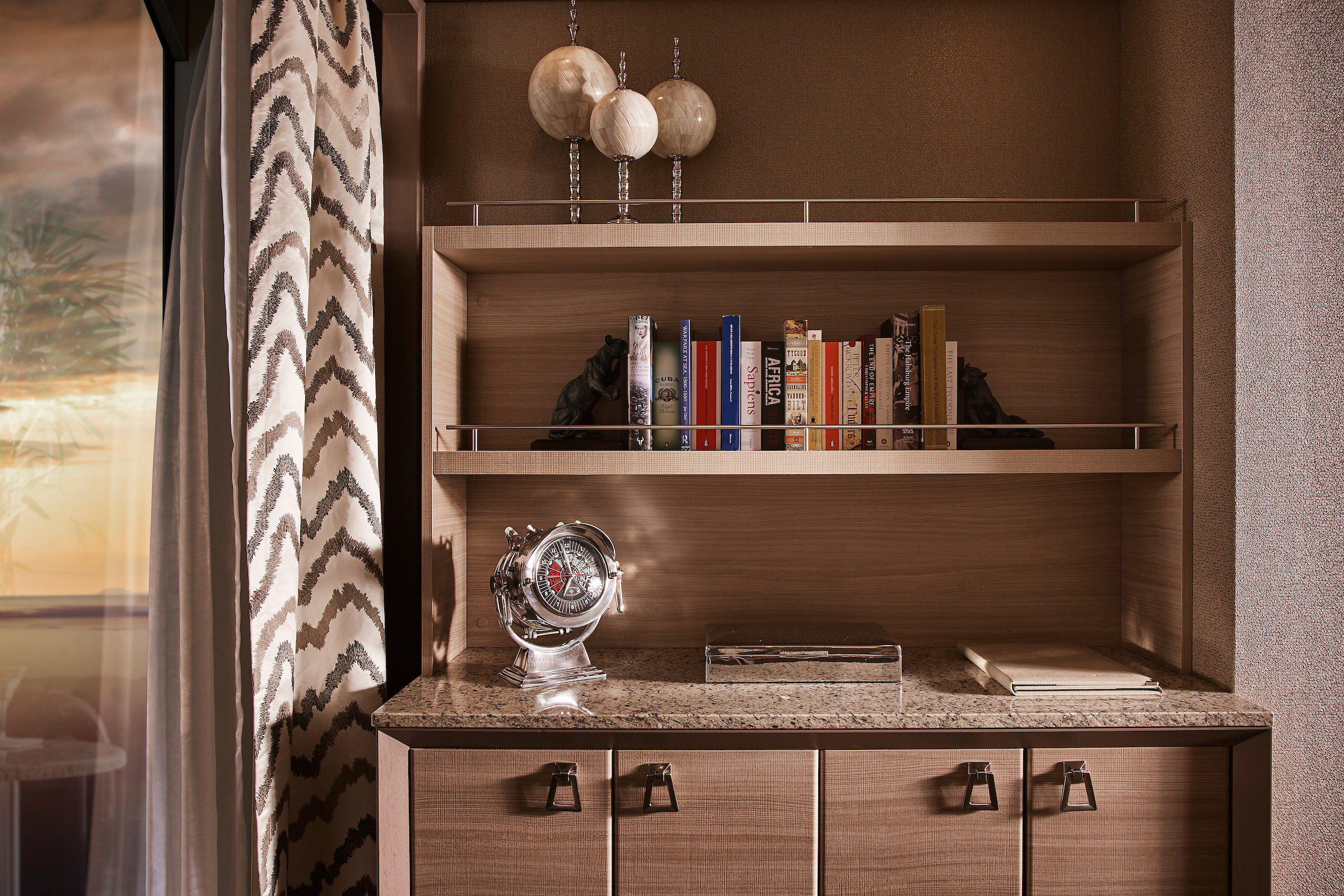
Picture yourself taking a delicious breakfast on your private veranda. Imagine watching the sun set, a flute of chilled champagne in hand, setting sail for your next destination. Prestigious, classic and sophisticated, this stylish apartment suite offers the ultimate in finest accommodation on board. Set aside for those who seek a superlative level of space, comfort and service, the Owner’s Suite has it all. The adjoining bedroom, with its en-suite bathroom, offers its own spectacular sea views.
One bedroom: 88-98 sq.m. including veranda
Two bedroom: 119-129 sq.m. including veranda*
*The difference in size is largely due to a larger entry corridor space and does not concern the living or sleeping area.
Images are intended as a general reference. Features, materials, finishes and layout may be different than shown.
Please note that the 3rd guest will sleep on a comfortable sofa bed in the reception area of the suite.
Essentials
- Deck(s): 9
- Section: Mid-Ship
Characteristics
- Veranda
- Separate dining area
- Living room with sitting area
- Double vanity
- Separate shower
- Whirlpool bath
- Walk-in wardrobe with personal safe
Furniture
- King size bed
- Writing desk
- Vanity table
- Luxury bed mattresses
Media & Communication
- Unlimited Premium Wi-Fi
- 2 large flat screen TVs with Interactive Media Library
- Sound system with bluetooth connectivity
- Direct dial telephone
- Wall mounted USB-C mobile device chargers
- Dual voltage 110/220 outlets
Onboard Services
- Butler service
- Complimentary laundry, pressing & wet cleaning
- Daily canape service, Welcome chocolate, Welcome fruit stand
- Dinner for two in La Dame, one evening per voyage,
- Two hours of worldwide phone use, per voyage segment
- Champagne on arrival
Amenities
- Espresso machine
- Pillow menu
- Refrigerator and bar setup stocked with your preferences
- Plush bathrobe
- Luxury bath amenities
- Umbrella
- Hair Dryer
- Slippers
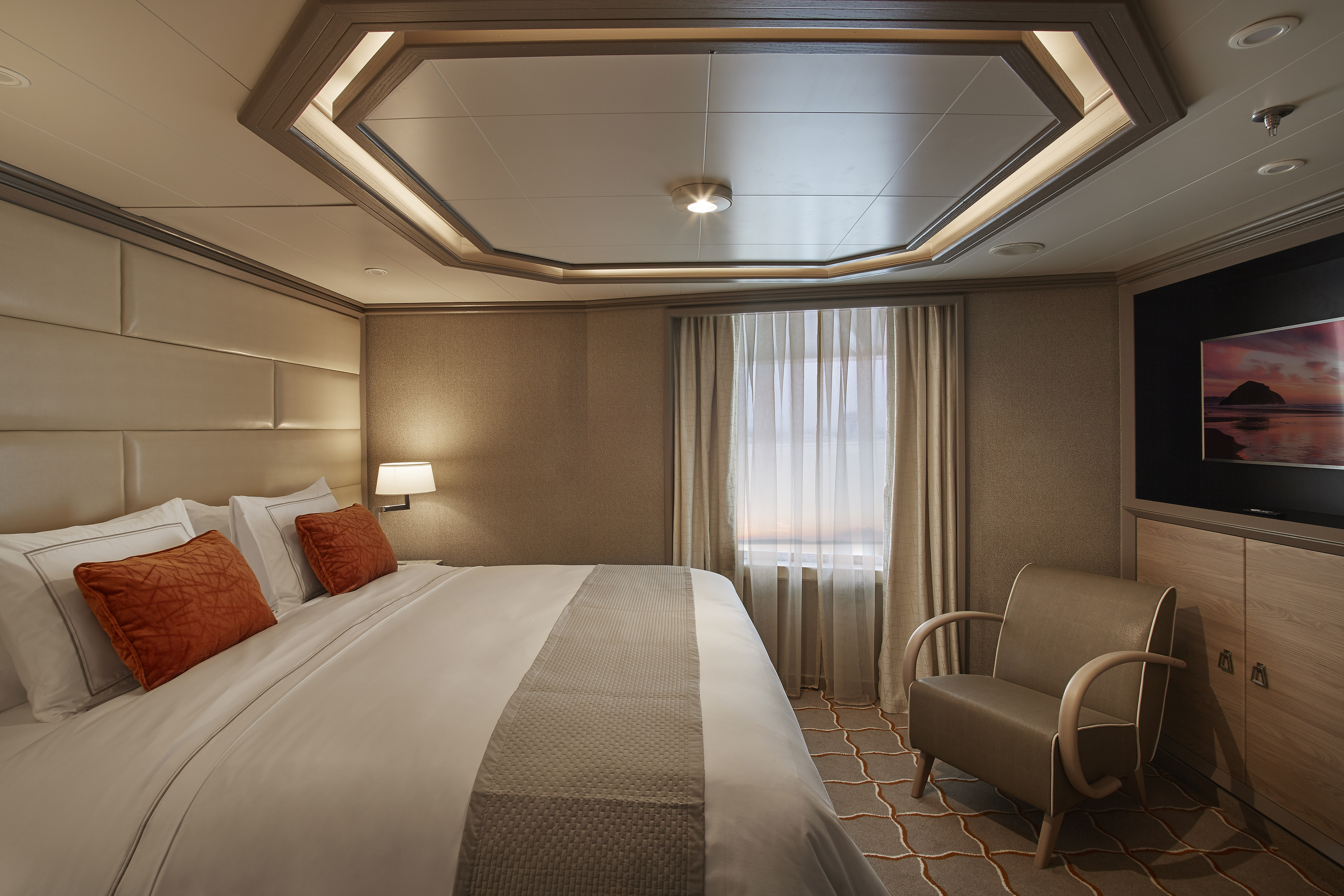
Indulge in the epitome of ultra-luxury cruising. The Grand Suite is for those who want to experience sailing in style. The sophistication of the Silversea philosophy coupled with ample interior and exterior space makes this the perfect choice for serious travellers. With the biggest verandas on board, enjoy entertaining new friends or simply sharing intimate meals while contemplating spectacular sunsets. Savour the sense of well-being offered by the luxurious furnishings and modern amenities. Offering an unprecedented level of relaxation, the Grand Suite is the perfect romantic getaway.
One bedroom: 137-146 sq.m. including veranda
Two bedroom: 174-183 sq.m. including veranda
Images are intended as a general reference. Features, materials, finishes and layout may be different than shown.
Please note that the 3rd guest will sleep on a comfortable sofa bed in the reception area of the suite.
Essentials
- Deck(s): 8, 9
- Section: Forward
Characteristics
- Veranda
- Separate dining area
- Living room with sitting area
- Double vanity
- Separate shower
- Whirlpool bath
- Walk-in wardrobe with personal safe
Furniture
- King size bed
- Writing desk
- Vanity table
- Luxury bed mattresses
Media & Communication
- Unlimited Premium Wi-Fi
- 2 large flat screen TVs with Interactive Media Library
- Sound system with bluetooth connectivity
- Direct dial telephone
- Wall mounted USB-C mobile device chargers
- Dual voltage 110/220 outlets
Onboard Services
- Butler service
- Complimentary laundry, pressing & wet cleaning
- Daily canape service, Welcome chocolate, Welcome fruit stand
- Dinner for two in La Dame, one evening per voyage,
- Two hours of worldwide phone use, per voyage segment
- Champagne on arrival
Amenities
- Espresso machine
- Pillow menu
- Refrigerator and bar setup stocked with your preferences
- Plush bathrobe
- Luxury bath amenities
- Umbrella
- Hair Dryer
- Slippers
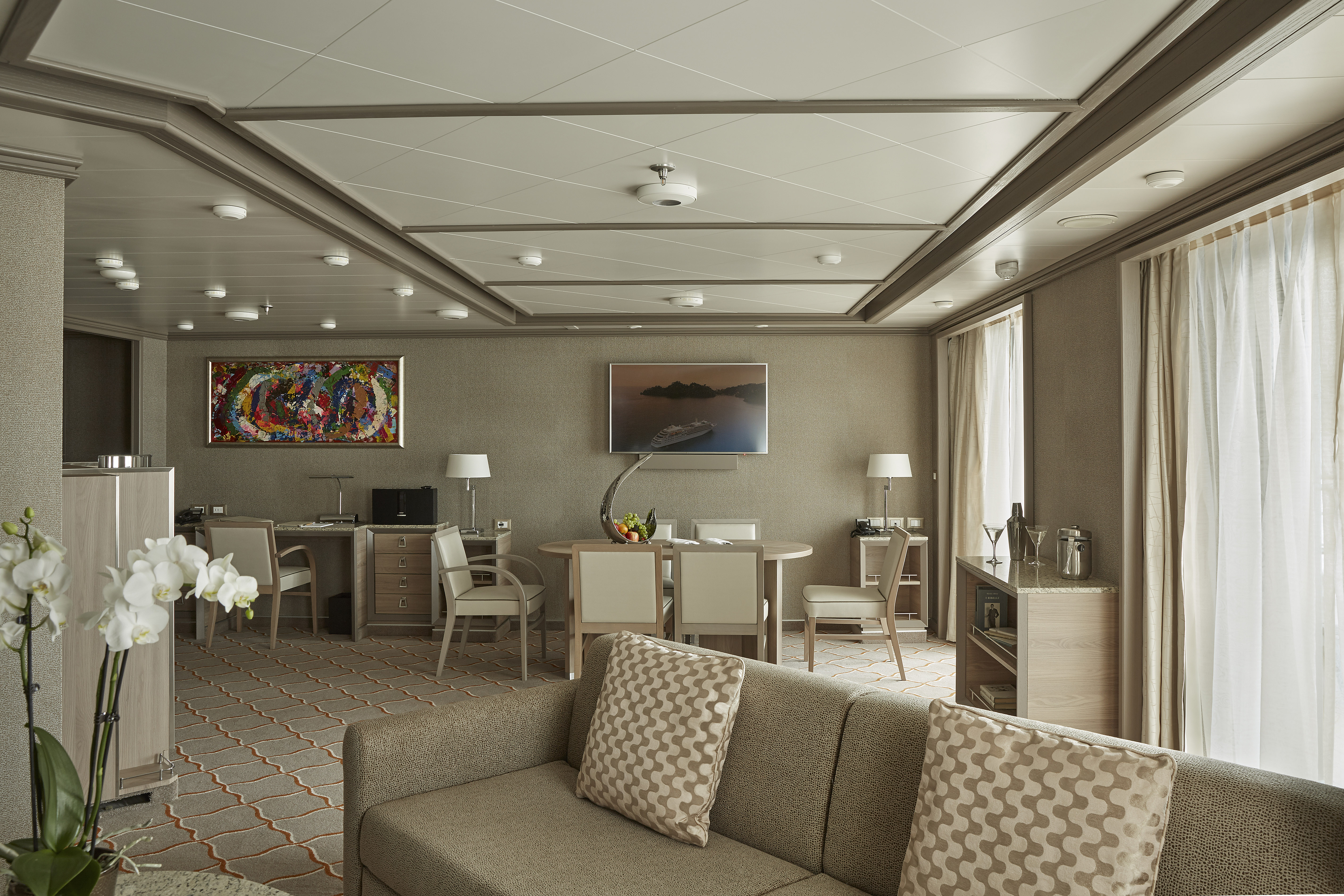
Designed with the values of the culture of living in mind, the Royal Suite offers a vast, eloquent space. Precise lines, authentic Italian craftsmanship and fine materials make up just some of the details of this stunning suite. Commanding and majestic, the Royal Suite boasts a lavish living area perfect for entertaining, plush interior furnishings and sweeping seascapes from the private terrace. The comfort of the spacious apartment makes this the ideal space for those wanting to feel the true comfort and luxury of the Silversea philosophy.
One bedroom: 105 sq.m. including veranda
Two bedroom: 142 sq.m. including veranda
Images are intended as a general reference. Features, materials, finishes and layout may be different than shown. Front bedroom windows partially obstructed by deck equipment.
Please note that the 3rd guest will sleep on a comfortable sofa bed in the reception area of the suite.
Essentials
- Deck(s): 7
- Section: Forward
Characteristics
- Veranda
- Separate dining area
- Living room with sitting area
- Double vanity
- Separate shower
- Whirlpool bath
- Walk-in wardrobe with personal safe
Furniture
- King size bed
- Writing desk
- Vanity table
- Luxury bed mattresses
Media & Communication
- Unlimited Premium Wi-Fi
- 2 large flat screen TVs with Interactive Media Library
- Sound system with bluetooth connectivity
- Direct dial telephone
- Wall mounted USB-C mobile device chargers
- Dual voltage 110/220 outlets
Onboard Services
- Butler service
- Complimentary laundry, pressing & wet cleaning
- Daily canape service, Welcome chocolate, Welcome fruit stand
- Dinner for two in La Dame, one evening per voyage,
- Two hours of worldwide phone use, per voyage segment
- Champagne on arrival
Amenities
- Espresso machine
- Pillow menu
- Refrigerator and bar setup stocked with your preferences
- Plush bathrobe
- Luxury bath amenities
- Umbrella
- Hair Dryer
- Slippers
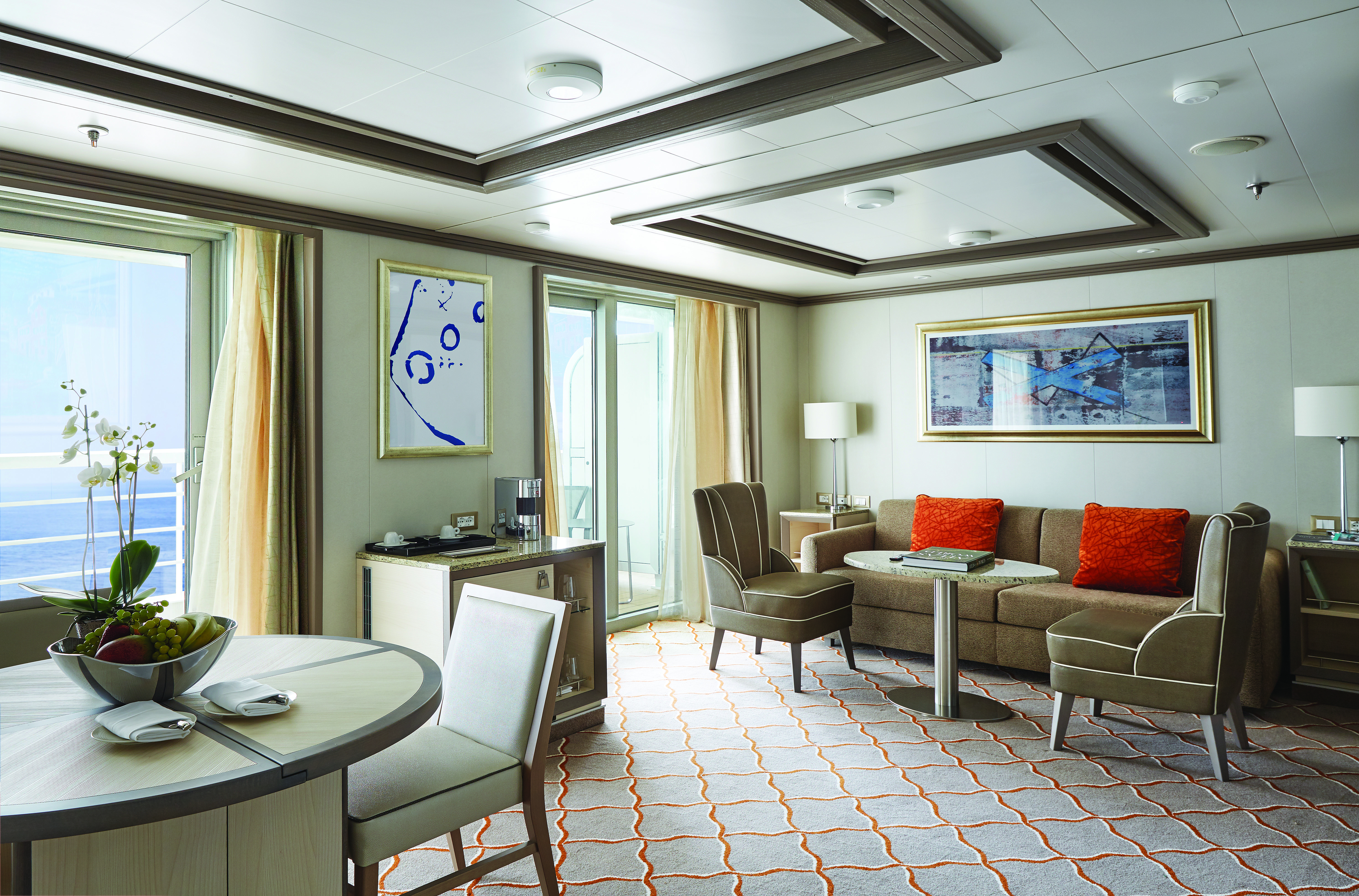
Step onto your terrace and bask in the calm feeling of the ocean breeze. Dissolve into the comfort of your king size bed. Prepare for the evening in the beautiful marble bathroom. The upper deck location gives the most spectacular of sea views, the spacious living area allows for comfortable relaxing where cosy nights in become veritable experiences in themselves. The two-bedroom configuration of this suite makes this it the ideal option for families.
One bedroom: 73 sq.m. including veranda
Images are intended as a general reference. Features, materials, finishes and layout may be different than shown.
Please note that the 3rd guest will sleep on a comfortable sofa bed in the reception area of the suite.
Two bedroom: 104 sq.m. including veranda
Wheelchair accessible suite: 931
Essentials
- Deck(s): 9, 10, 11
- Section: Forward, Mid-Ship
Characteristics
- Veranda
- Living room with sitting area
- Double vanity
- Separate shower
- Whirlpool bath
- Walk-in wardrobe with personal safe
Furniture
- King size bed
- Writing desk
- Vanity table
- Luxury bed mattresses
Media & Communication
- Unlimited Premium Wi-Fi
- 2 large flat screen TVs with Interactive Media Library
- Sound system with bluetooth connectivity
- Direct dial telephone
- Wall mounted USB-C mobile device chargers
- Dual voltage 110/220 outlets
Onboard Services
- Butler service
- Complimentary laundry, pressing & wet cleaning
- Daily canape service, Welcome chocolate, Welcome fruit stand
- Champagne on arrival
Amenities
- Espresso machine
- Pillow menu
- Refrigerator and bar setup stocked with your preferences
- Plush bathrobe
- Luxury bath amenities
- Umbrella
- Hair Dryer
- Slippers
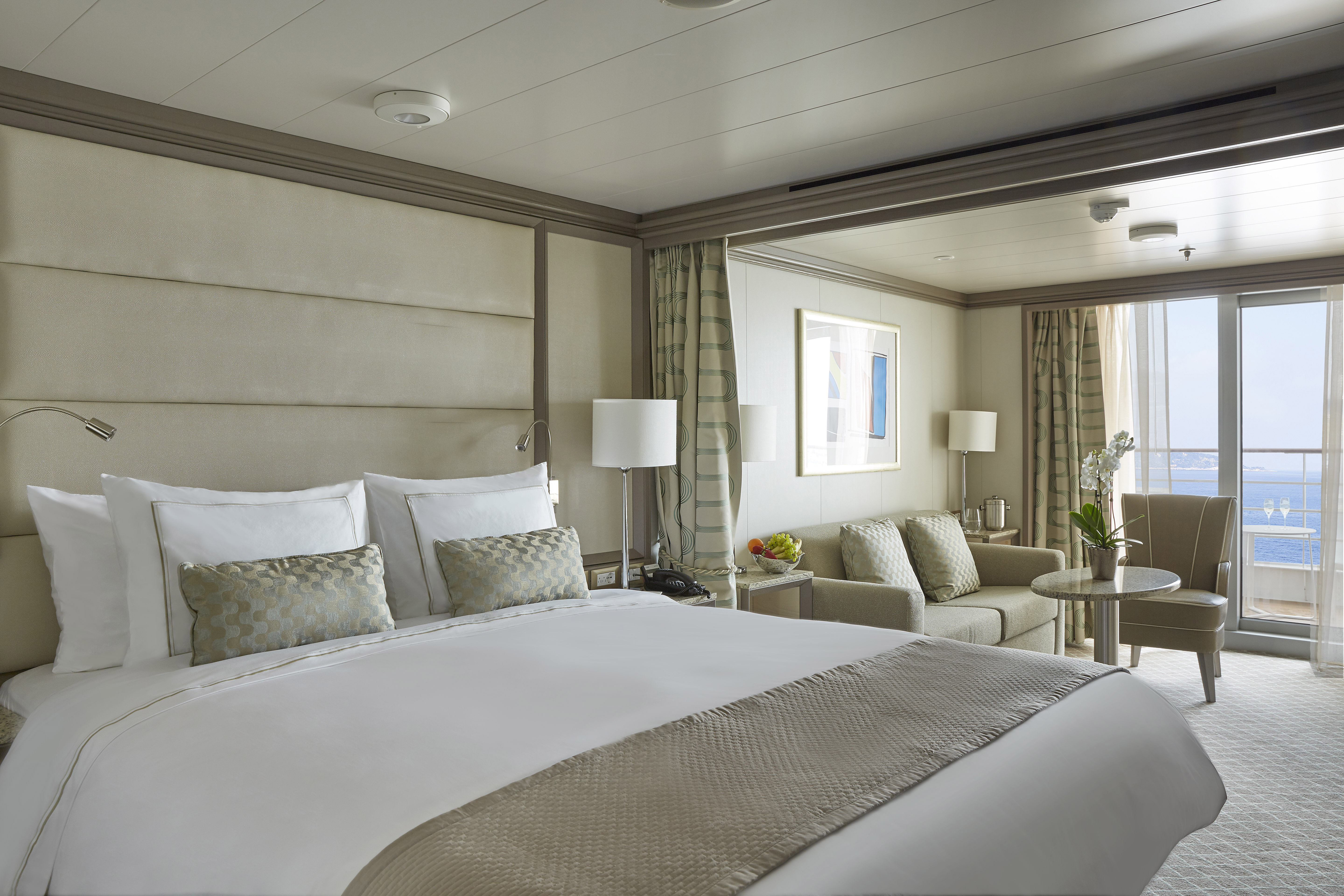
The Deluxe Veranda Suite offers a comfortable living space, close to the heart of the ship. With its preferred mid-ship location and all the comfort and attention to detail that you can expect aboard, the Deluxe Veranda Suite is the savvy traveller’s paradise— both inside and out. Elegant décor, stunning marble bathroom and ample seating area, make this a cosy home away from home. But perhaps this suite’s finest asset lies just outside, as floor-to-ceiling glass doors open onto a private veranda, making every sunset feel as if it is yours alone.
One bedroom: 36 sq.m. including veranda
Images are intended as a general reference. Features, materials, finishes and layout may be different than shown.
Please note that the 3rd guest will sleep on a comfortable sofa bed in the reception area of the suite.
Essentials
- Deck(s): 6, 7, 8
- Section: Mid-Ship
Characteristics
- Veranda
- Sitting area
- Standard vanity
- Separate shower
- Full-size bath
- Walk-in wardrobe with personal safe
Furniture
- Queen size bed
- Writing desk
- Luxury bed mattresses
Media & Communication
- Unlimited Standard Wi-Fi
- 1 large flat screen TV with Interactive Media Library
- Direct dial telephone
- Wall mounted USB-C mobile device chargers
- Dual voltage 110/220 outlets
Onboard Services
- Butler service
- Champagne on arrival
Amenities
- Pillow menu
- Refrigerator and bar setup stocked with your preferences
- Plush bathrobe
- Luxury bath amenities
- Umbrella
- Hair Dryer
- Slippers

Located on the upper deck, and offering spectacular sunset views, the Superior Veranda Suite has all the comforts and luxury that you can expect aboard. A comfortable living space, attention to detail and a generous expanse of amenities, this stunning suite makes for a cosy home while on the seas. But perhaps this suite’s finest asset lies just outside, as floor-to-ceiling glass doors open onto a private veranda, making every sunset feel as if it is yours alone.
One bedroom: 36 sq.m. including veranda
Images are intended as a general reference. Features, materials, finishes and layout may be different than shown.
Please note that the 3rd guest will sleep on a comfortable sofa bed in the reception area of the suite.
Essentials
- Deck(s): 7, 8, 9
- Section: Forward
Characteristics
- Veranda
- Sitting area
- Standard vanity
- Separate shower
- Full-size bath
- Walk-in wardrobe with personal safe
Furniture
- Queen size bed
- Writing desk
- Luxury bed mattresses
Media & Communication
- Unlimited Standard Wi-Fi
- 1 large flat screen TV with Interactive Media Library
- Direct dial telephone
- Wall mounted USB-C mobile device chargers
- Dual voltage 110/220 outlets
Onboard Services
- Butler service
- Champagne on arrival
Amenities
- Pillow menu
- Refrigerator and bar setup stocked with your preferences
- Plush bathrobe
- Luxury bath amenities
- Umbrella
- Hair Dryer
- Slippers

The Classic Veranda Suite provides generous living space for voyagers. Located lower bow, the Classic Veranda Suite offers all the comfort and attention to detail that you can expect aboard — both inside and out. A generous expanse of interior comforts — elegant décor, stunning marble bathroom and ample seating area, make this a cosy home away from home. But perhaps this suite’s finest asset lies just outside, as floor-to-ceiling glass doors open onto a private veranda, making every sunset feel as if it is yours alone.
One bedroom: 36 sq.m. including veranda
Images are intended as a general reference. Features, materials, finishes and layout may be different than shown.
Essentials
Deck(s): 5, 6
Section: Forward
Characteristics
- Veranda
- Sitting area
- Standard vanity
- Separate shower
- Full-size bath
- Walk-in wardrobe with personal safe
Furniture
- Queen size bed
- Writing desk
- Luxury bed mattresses
Media & Communication
- Unlimited Standard Wi-Fi
- 1 large flat screen TV with Interactive Media Library
- Direct dial telephone
- Wall mounted USB-C mobile device chargers
- Dual voltage 110/220 outlets
Onboard Services
- Butler service
- Champagne on arrival
Amenities
- Pillow menu
- Refrigerator and bar setup stocked with your preferences
- Plush bathrobe
- Luxury bath amenities
- Umbrella
- Hair Dryer
- Slippers
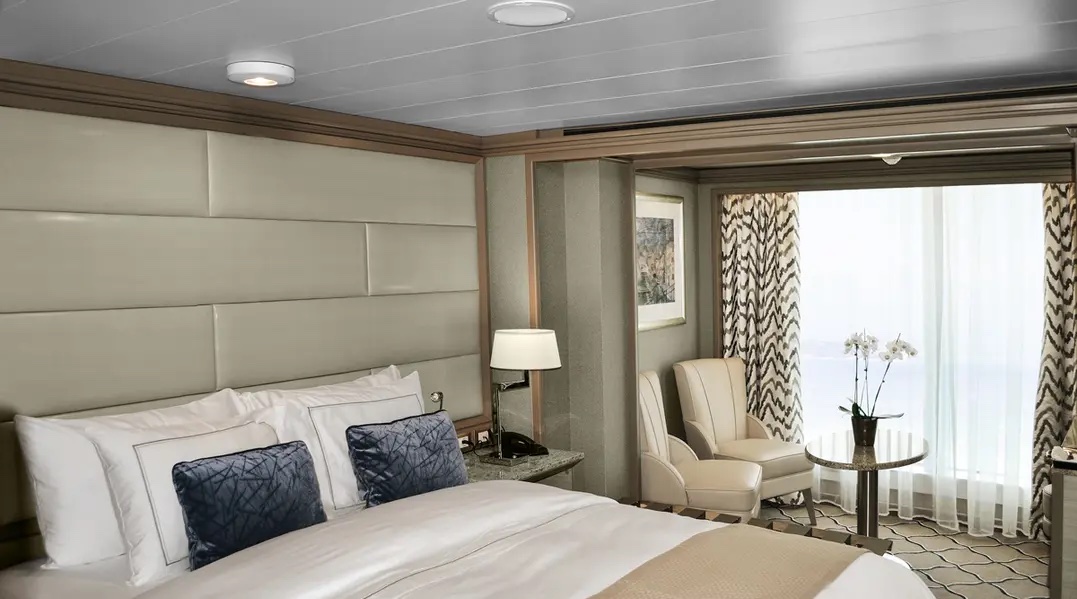
The Panorama Suite provides generous living space for voyagers. Located on deck 9, the Panorama offers all the comfort and attention to detail that you can expect aboard. A generous expanse of interior comforts — elegant décor, stunning marble bathroom and ample seating area, make this a cosy home away from home. The seating area of the Panorama Suite has plenty of room to relax, while large picture windows frame panoramic ocean views.
One bedroom: 31 sq.m.
Images are intended as a general reference. Features, materials, finishes and layout may be different than shown.
Essentials
- Deck(s): 9
- Section: Forward
Characteristics
- Floor-to ceiling window
- Sitting area
- Standard vanity
- Separate shower
- Full-size bath
- Walk-in wardrobe with personal safe
Furniture
- Queen size bed
- Writing desk
- Luxury bed mattresses
Media & Communication
- Unlimited Standard Wi-Fi
- 1 large flat screen TV with Interactive Media Library
- Direct dial telephone
- Wall mounted USB-C mobile device chargers
- Dual voltage 110/220 outlets
Onboard Services
- Butler service
- Champagne on arrival
Amenities
- Pillow menu
- Refrigerator and bar setup stocked with your preferences
- Plush bathrobe
- Luxury bath amenities
- Umbrella
- Hair Dryer
- Slippers
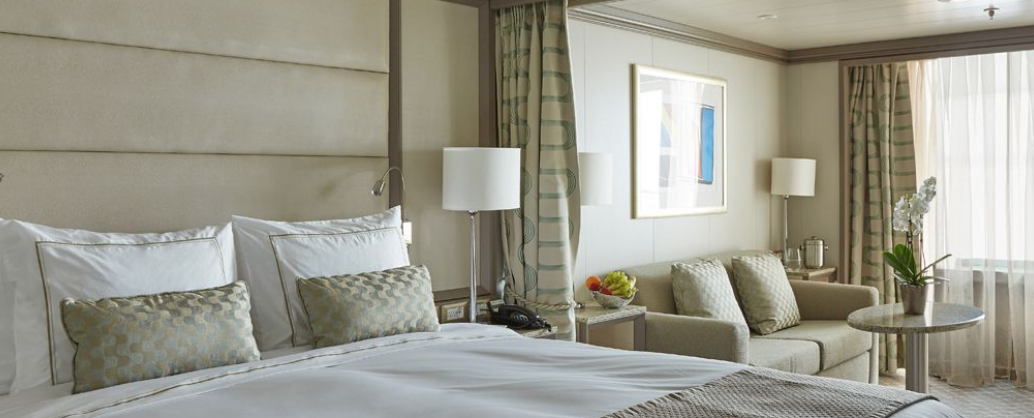
The Vista Suite provides generous living space for all travellers. The Vista Suite offers all the comfort and attention to detail that you can expect aboard. A generous expanse of interior comforts — elegant décor, stunning marble bathroom and ample seating area, make this a cosy home away from home. The seating area of the Vista Suite has plenty of room to relax, while large picture windows frame panoramic ocean views, the perfect backdrop for breakfast in bed! 3 Wheelchair Accessible Suites (407, 409, 417)
One bedroom: 32 sq.m.
Wheelchair accessible suites: 407, 409, 417
Images are intended as a general reference. Features, materials, finishes and layout may be different than shown.
Essentials
- Deck(s): 4
- Section: Forward
Characteristics
- Window
- Sitting area
- Standard vanity
- Separate shower
- Full-size bath
- Walk-in wardrobe with personal safe
Furniture
- Queen size bed
- Writing desk
- Luxury bed mattresses
Media & Communication
- Unlimited Standard Wi-Fi
- 1 large flat screen TV with Interactive Media Library
- Direct dial telephone
- Wall mounted USB-C mobile device chargers
- Dual voltage 110/220 outlets
Onboard Services
- Butler service
- Champagne on arrival
Amenities
- Pillow menu
- Refrigerator and bar setup stocked with your preferences
- Plush bathrobe
- Luxury bath amenities
- Umbrella
- Hair Dryer
- Slippers
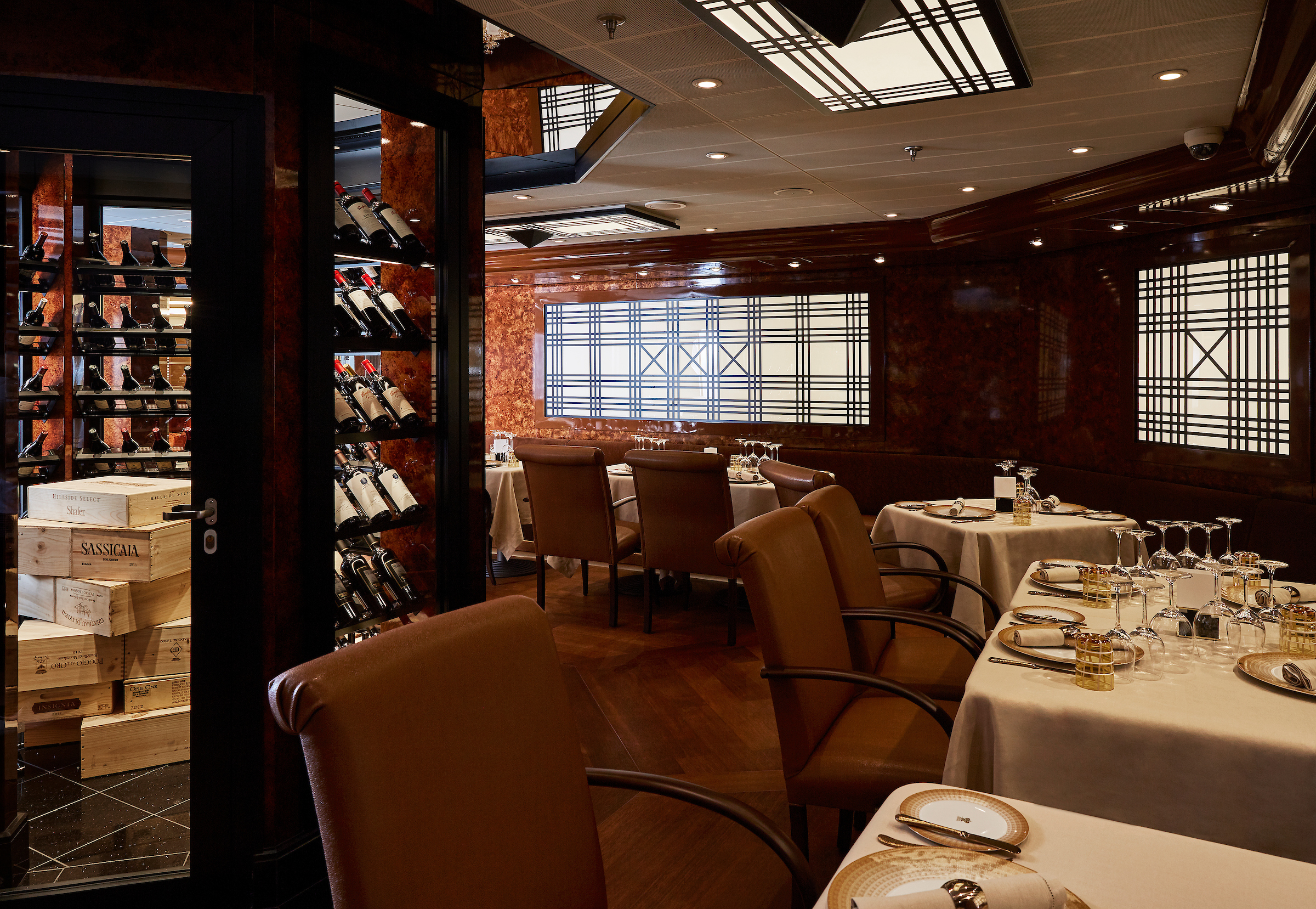
La Dame features a bespoke menu by our top chefs, and is the highest expression of excellence of French dining. The ambience is one of chic contemporary style, with crisp white table linens and the impeccable white gloved service associated with Silversea. Named after “La Dame de Paris” or the Eiffel Tower, La Dame echoes the traditions and cultures embedded in the French gastronomic past, while respecting its bright culinary future. Quintessentially Parisian, extremely elegant and very refined, meals at La Dame are a fusion of tradition and modernity.
Per guest reservation fee of US$60.
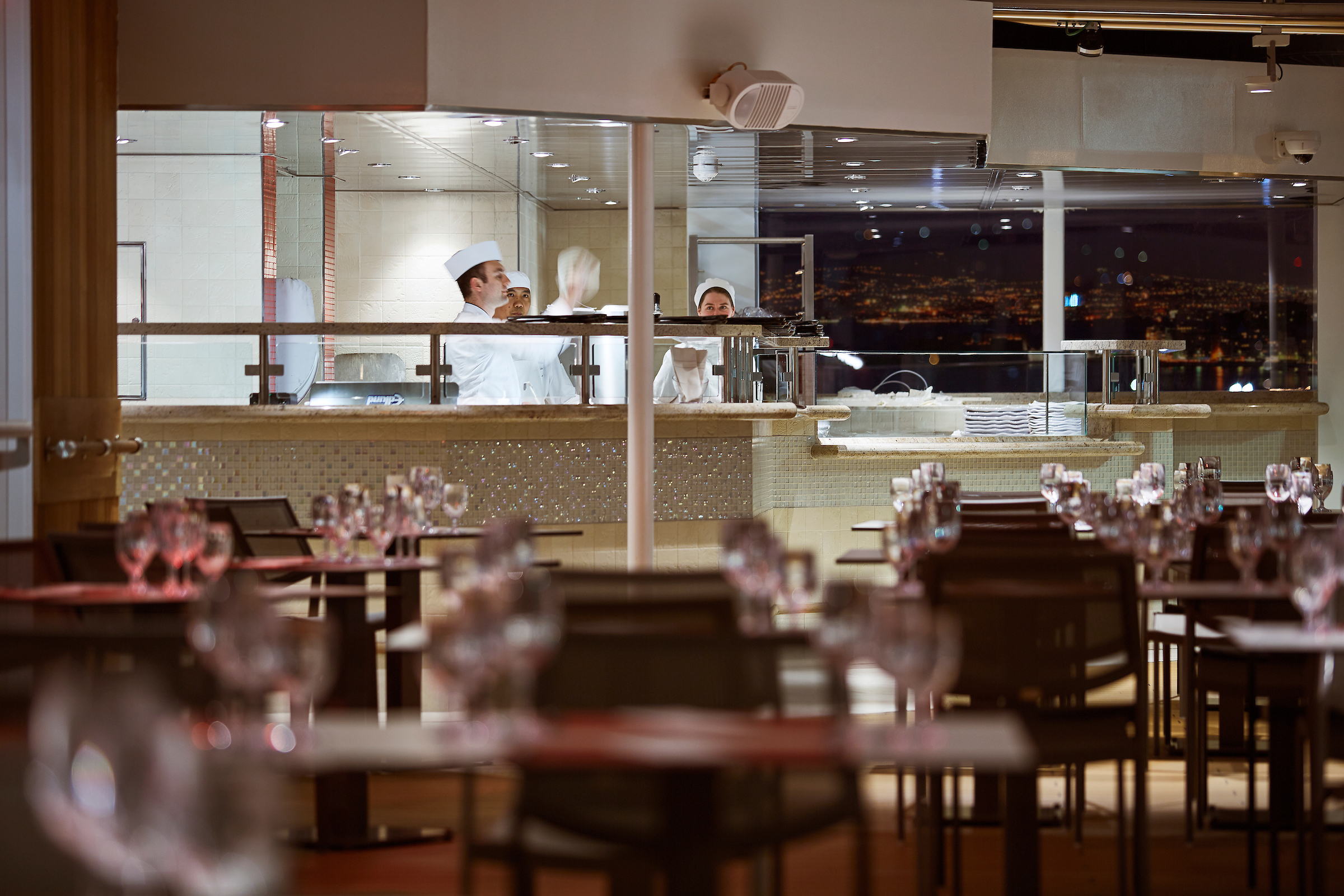
Soft breezes and ocean views beckon at the Grill, especially as the sun goes down when cruise guests gather for cocktails at the outdoor bar and talk about the day’s events.
One of the healthiest cuisines to exist, The Grill features lava stone cooking at its finest. Sourced from volcanic rock and placed in an oven to reach an optimum temperature of 400˚C, The Grill invites guests to cook their food directly at their table. Place your meat, fish or vegetables on top of the grill stone or inside the soup bowl, and then simply cook to your very own taste. Every bite is cooked to perfection, time after time. With the stone cooking available in the evenings only, The Grill becomes a daytime rotisserie and gourmet salad and burger bar, offering build your own burgers from the best selections of meat.
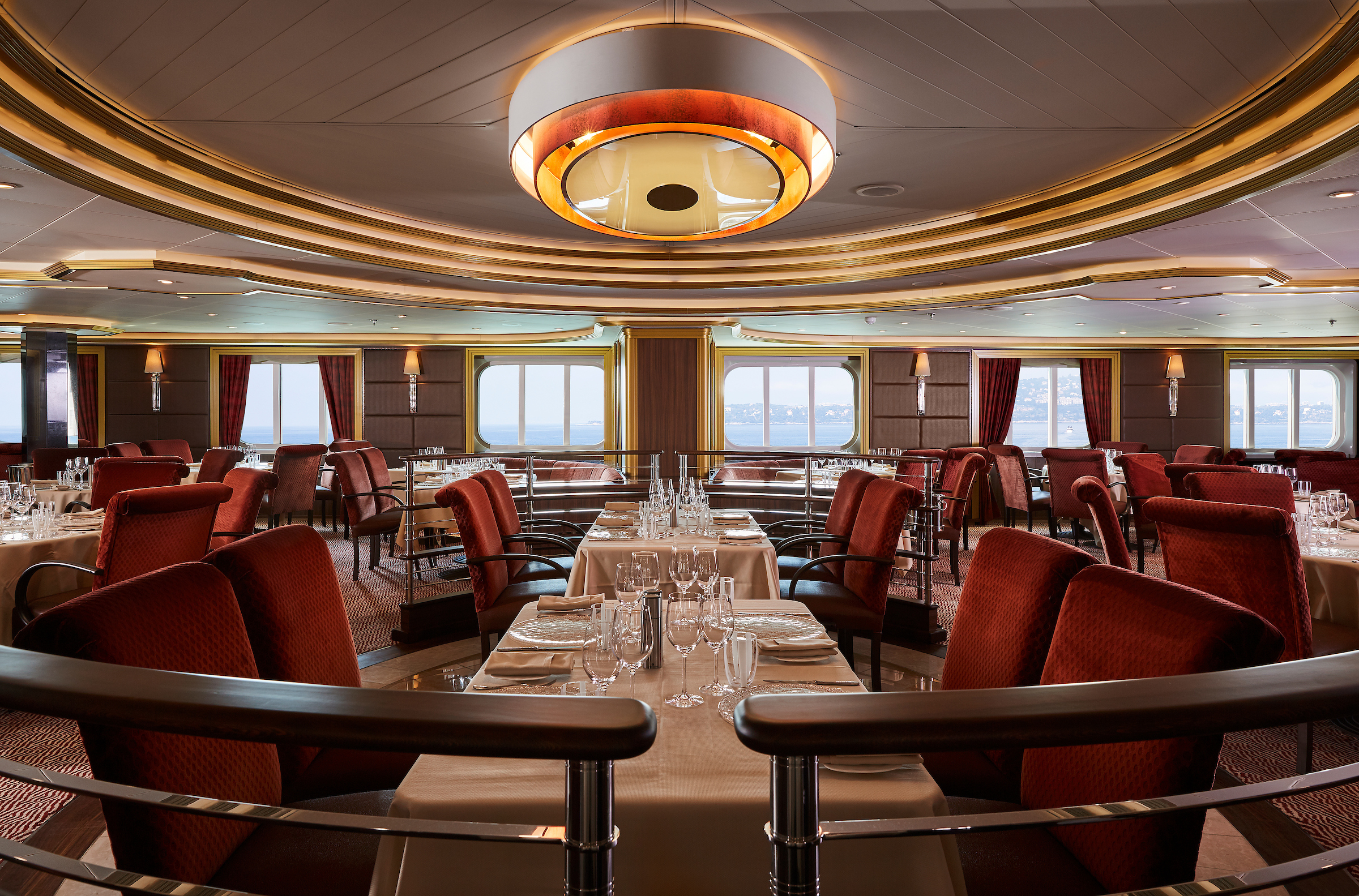
Pivotal to Silver Muse dining experience, this elegant bar and grill incorporates the best that the sea has to offer.
Instantly recalling images of the sea in all her watery majesty, the Atlantides are the seven nymph daughters of Atlas. Creative muses, known for their wisdom and beauty, the sisters were granted immortality in the form of stars and can be seen today in the constellation of Taurus. Pivotal to Silver Muse dining experience, this elegant bar and grill incorporates the best that the sea has to offer. Created to temper your taste buds, designer dishes such as royal crab, blue lobster and Verbena infused red snapper in a sea salt crust are showcased alongside the best steaks offshore.
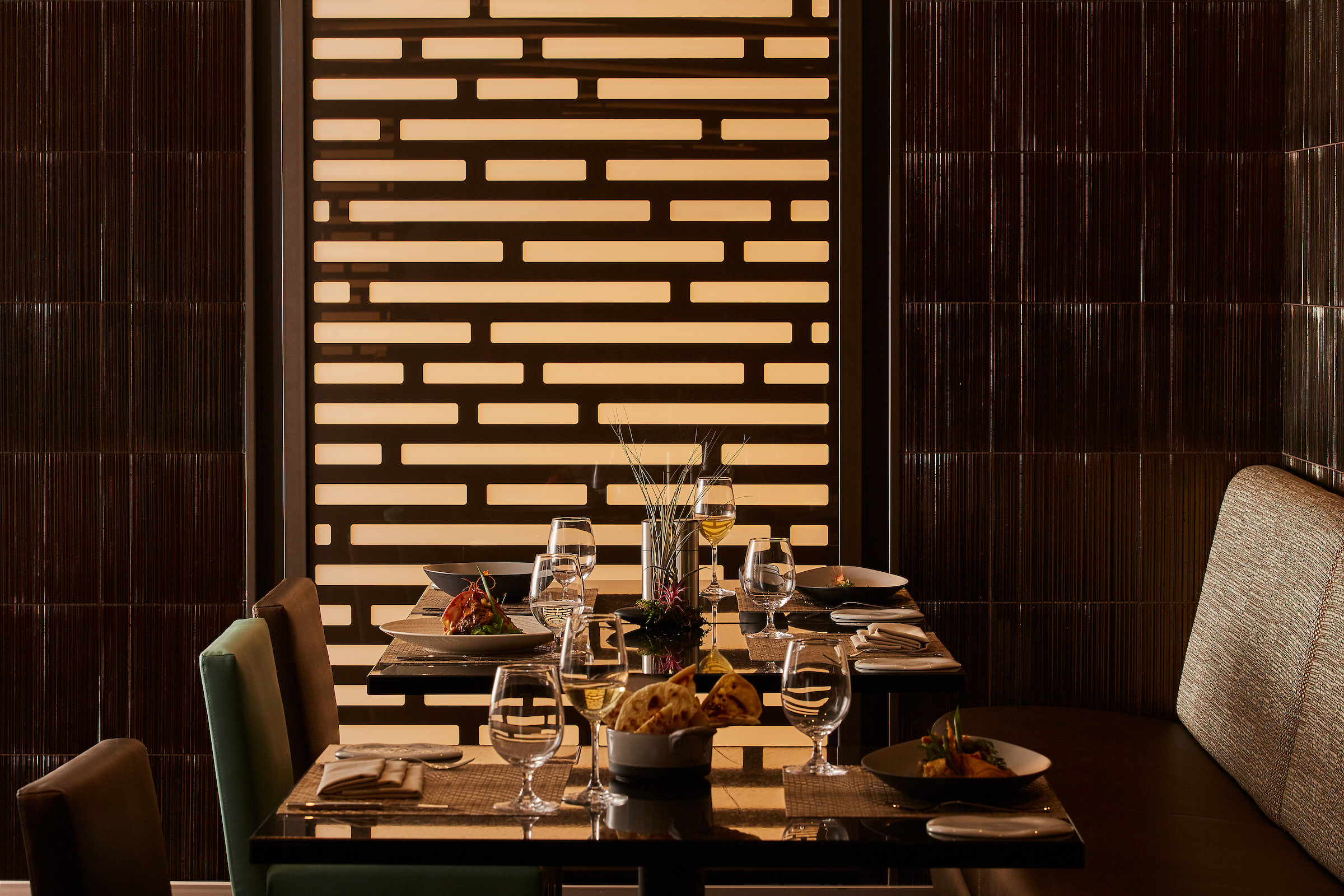
Evoking a sense of exotic mystery, the Asian-accented Indochine embarks you on an exquisite journey of culinary discovery. Unlock the hidden treasures of the spice markets of Mumbai, whet your appetite with the exoticism of Thailand and temper your taste buds with the cuisine of Vietnam. Elegant and exquisite dishes bursting with Asian essence awaken your gastronomic senses and immerse you in an expansive tapestry of the palate. Savour the fusion of flavours of a vast continent that defies definition — in a stylish restaurant that pays homage to its delectable cuisine.
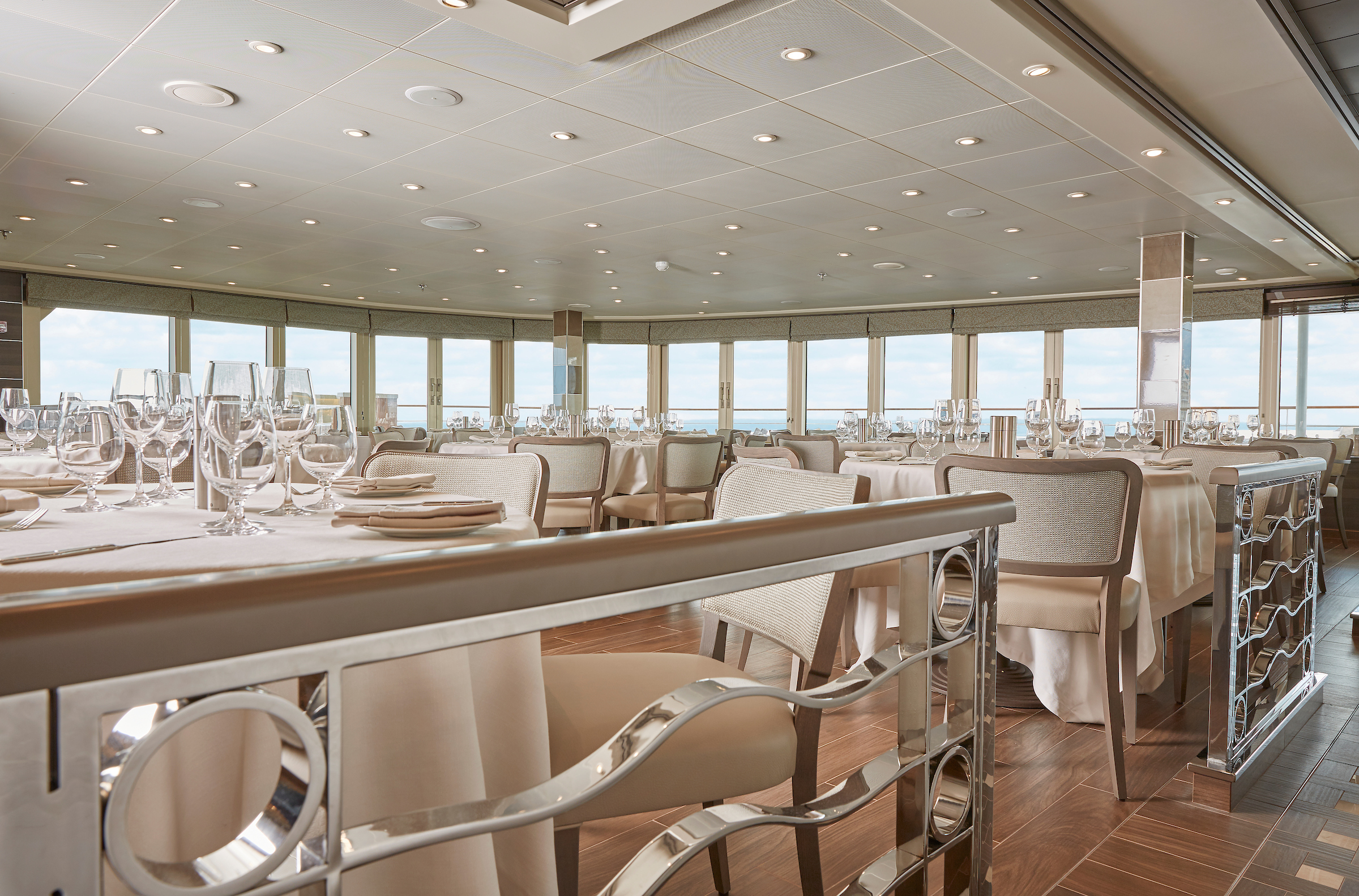
Authentic Italian recipes and the freshest, sustainable ingredients come together in this restaurant at sea.
An iconic hallmark of Silversea dining, La Terrazza offers authentic recipes and the freshest ingredients from our distinctive Italian heritage. This is where antipasti, primi and secondi come together with passion and flair in a flavourful expression from corporate chef Alberto Colombo’s imagination. La Terrazza aboard Silver Muse offers innovative interactive food stations: an olive oil cellar, a mozzarella bar, a seafood station and of course a salumeria. The à la carte menu has also been extended to include the popular Sapori di Casa, traditional family-style Italian daily specials.
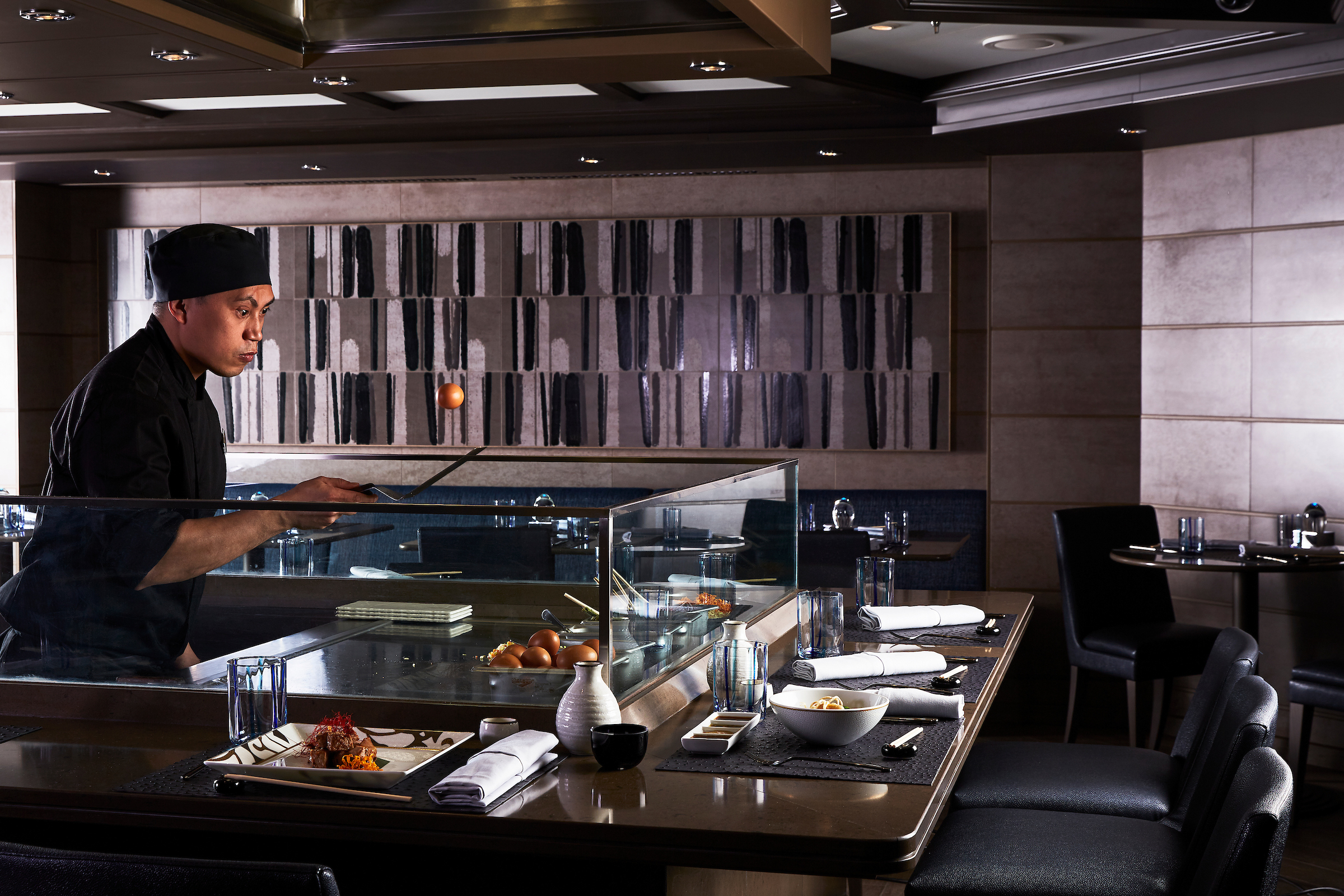
The fine art of Kaiseki lies in its meticulous preparation and beautiful presentation. Dishes reflect a passion for tradition and performance and our reinterpretation of these values is clear. Balanced menus have been inspired by the five elements of Japanese nutritional cuisine and respect the equilibrium of yin and yang. With teppanyaki available exclusively for evening diners, daytime menus feature a varied and balanced menu of sushi, sashimi and other raw Asian-inspired dishes.
Per guest reservation fee of US$40.
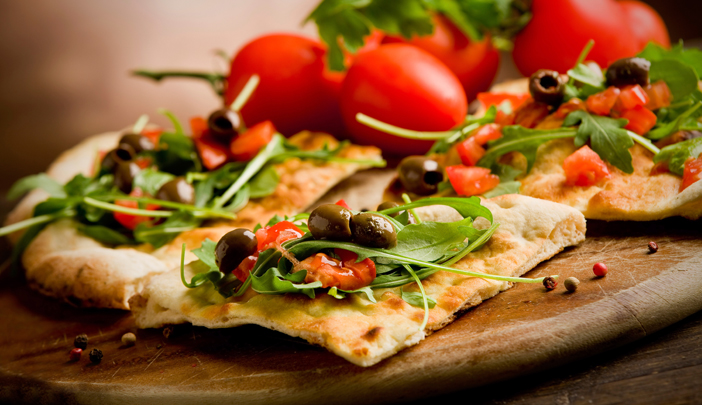
Reflecting Silversea’s Italian heritage, this emblematic street in Naples divides the city in two and is renowned for its pizzerias. No visit to the city is complete without a journey to Spaccanapoli. Therefore, it is unsurprising that Spaccanapoli aboard Silver Muse reflects the true Italian way of life: the freshest ingredients, authentic dough and a perfect sense of the fabled Italian lust for life. The simplicity of la dolce vita is reflected in the relaxed dining style of the restaurant.
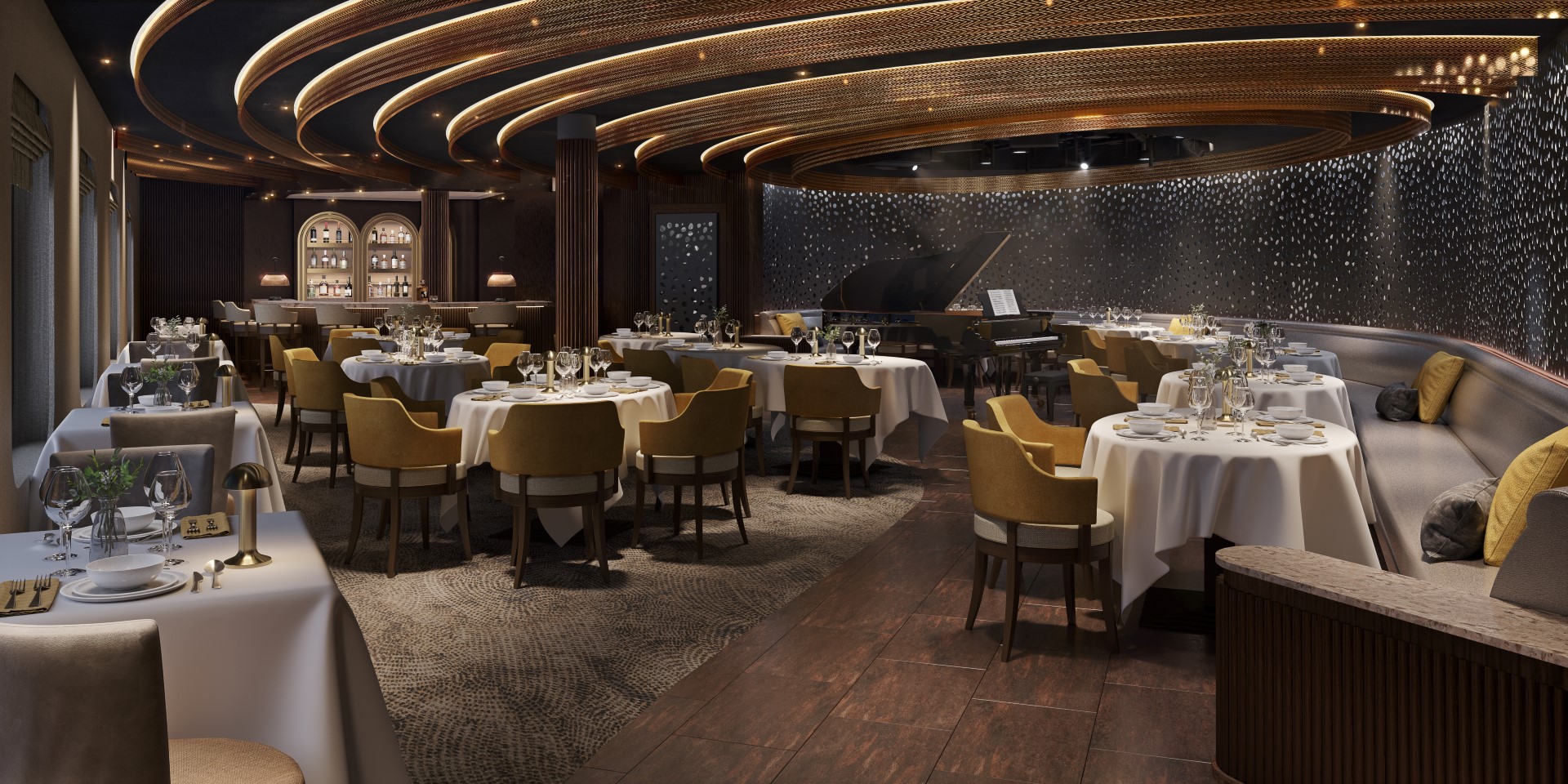
A sumptuous, intimate setting with a lively, joie de vivre ambience is the perfect place to dine, dance and dream the night away… Small plate tapas-style dishes of mouth-watering international cuisine perfectly compliment the rich, exciting entertainment as the smooth sounds of jazz and blues gently caress your ears. A refined late evening menu perfectly showcases the panache and style of Silver Muse’s plentiful dining options, so expect multi-sensory fireworks as you swing and sway effortlessly across the dance floor as Silver Muse gracefully takes you to your next destination.
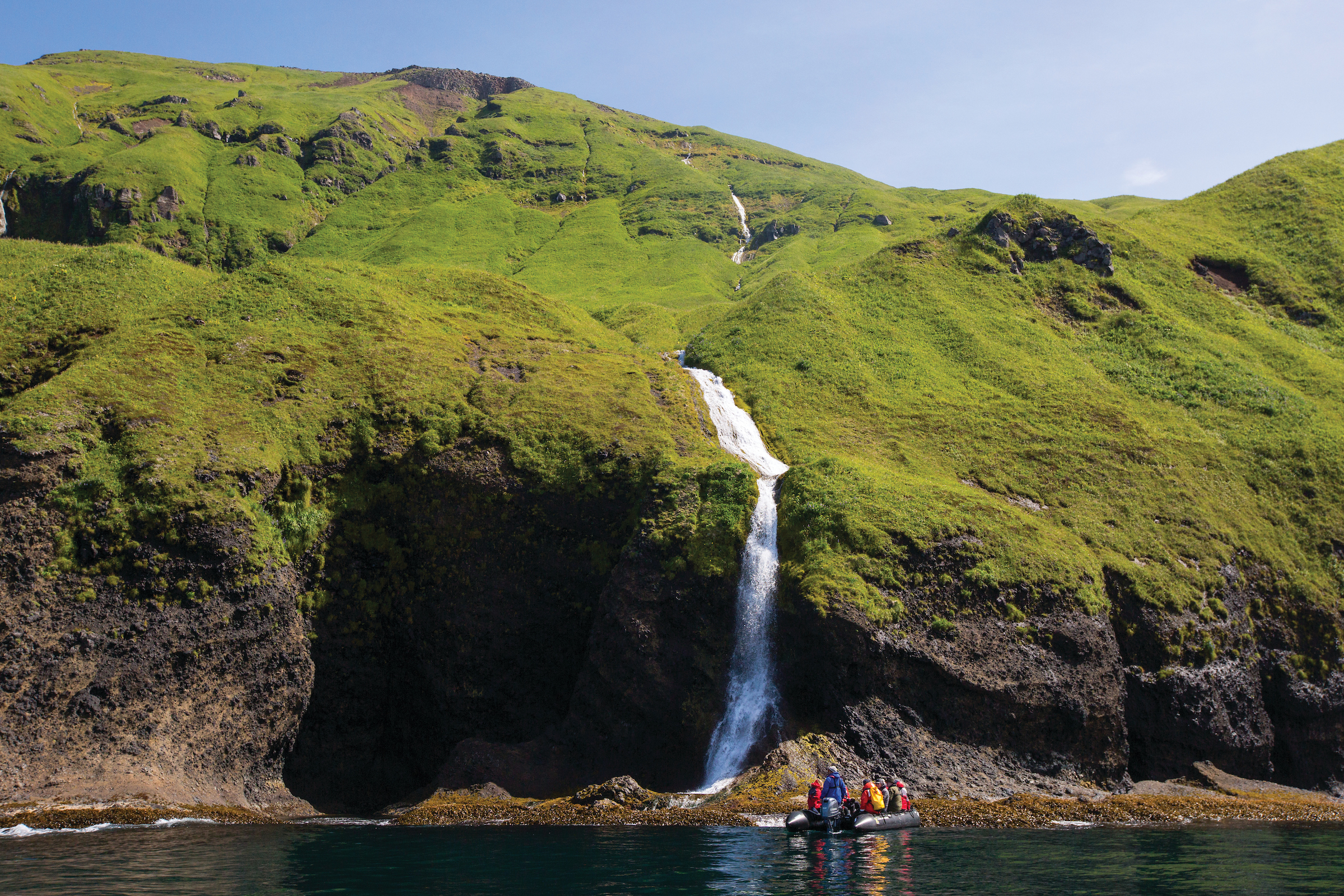
Silversea’s experienced Shore Concierge team are happy to assist, ensuring your shore- side experience is nothing less than a memory that lasts forever. Their knowledge and understanding of ports will truly add to your enjoyment and experience. Detailing history, local flavour, culture, regional customs, shopping tips and much more, they will make sure you get the best of your destination, wherever you are in the world.
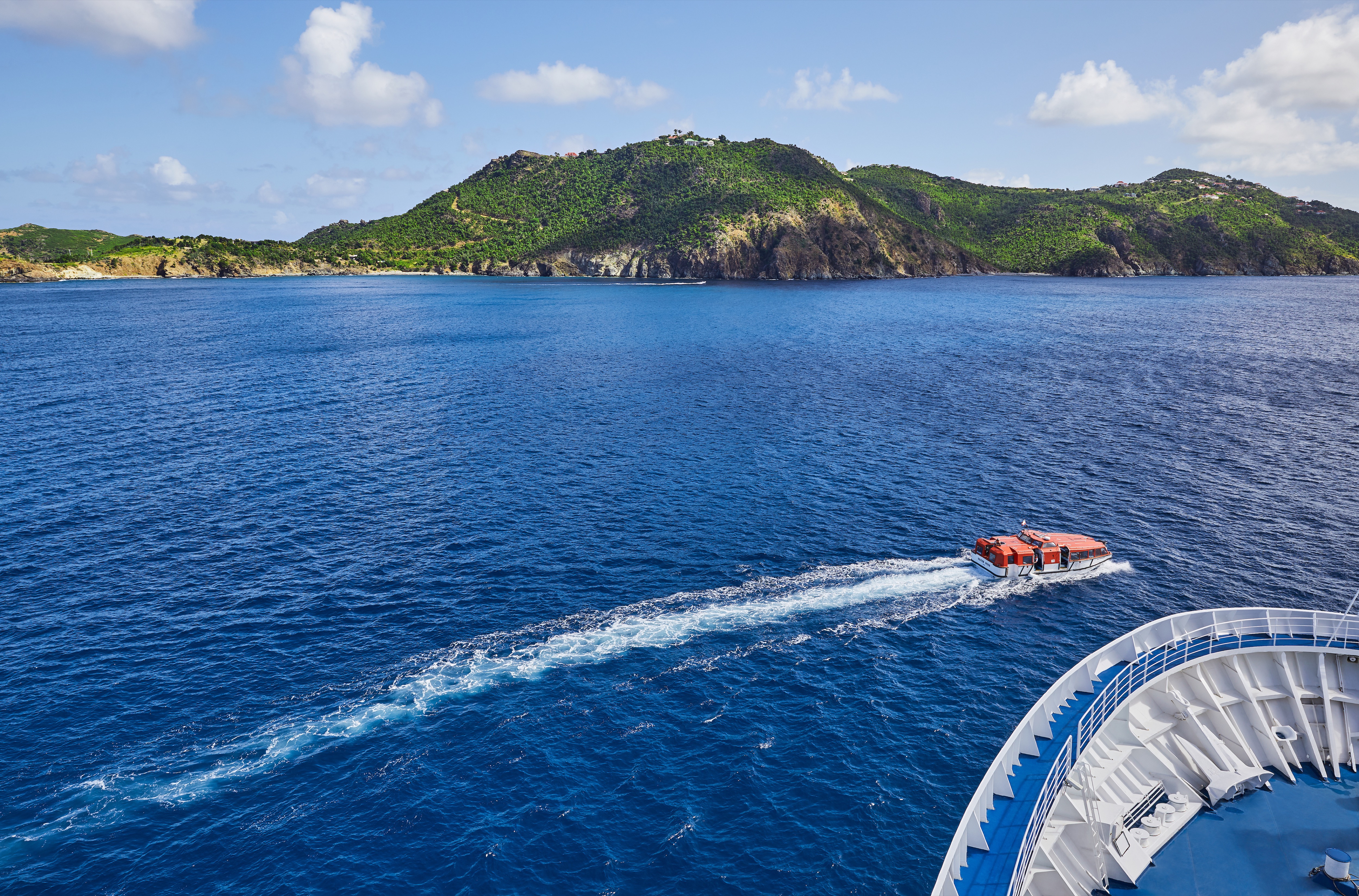
Multiple days at sea mean plenty of R & R for some, but others prefer to drink in all there is to offer on land. Our Mid-Cruise Land Adventures allow you to take full advantage of your time with us without missing a single thing! These short escapades offer an array of adventures, break up your sea days and allow for deeper exploration beyond the coast.
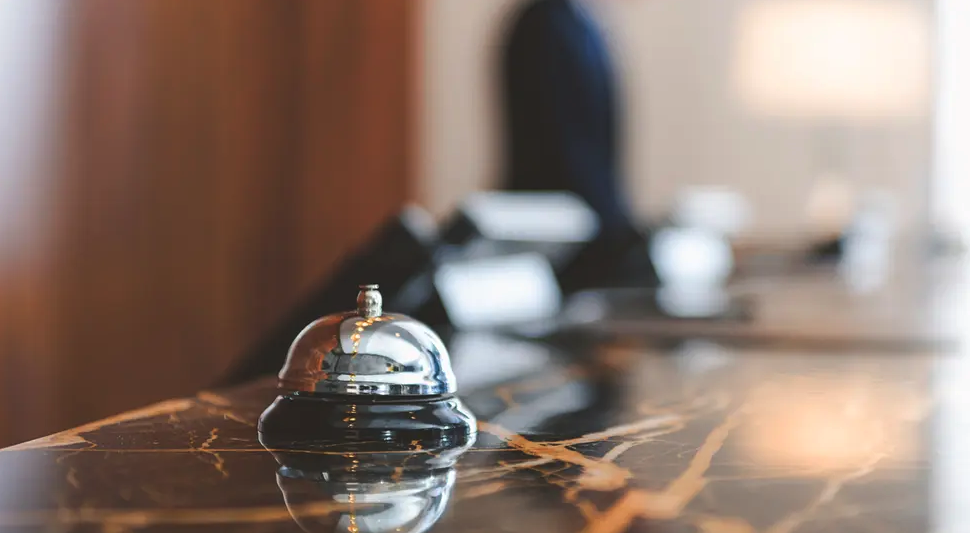
Let Silversea customise a special event or excursion exclusively for you. Expert Shore Excursion professionals are available to assist with all your shorex questions. Make an appointment and gain insider access to knowledgeable suggestions, personalised planning and hassle-free coordination of all private, independent touring, including area highlights, flightseeing, water sports, and much more. Take advantage of this service either in advance of your voyage by email at shoreconcierge@silversea.com or on board by visiting the Silvershore® Concierge desk. Have the Silver Shore Concierge create your tailor-made tour, or be whisked away by private car for a day — the pace and agenda are up to you.
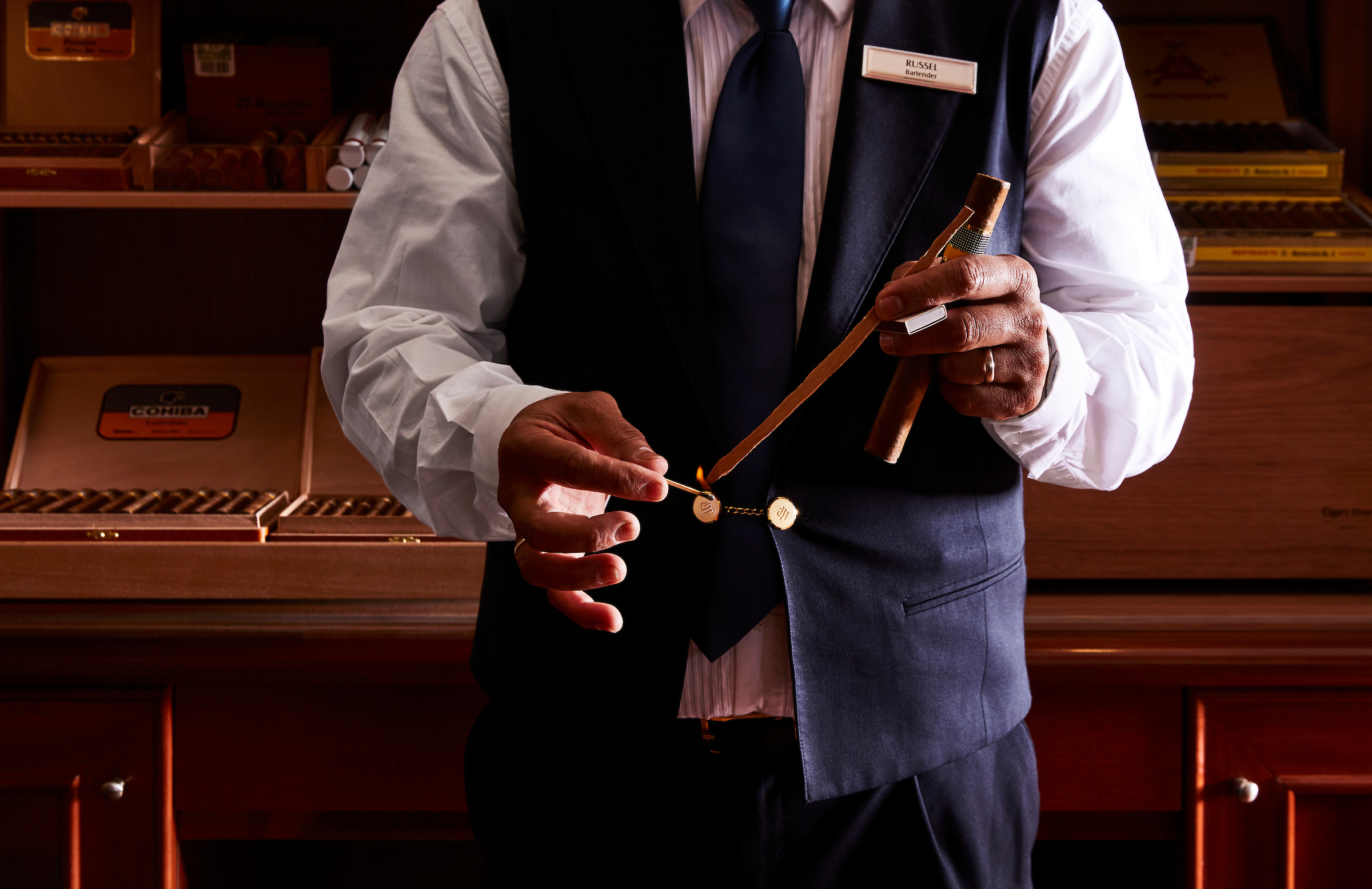
Rich and luxurious, yet airy and spacious, this indoor/outdoor venue is where you sip the finest cognac or whisky from a prestigious range and revel in the tranquil murmur of after-dinner conversation.
Discreet. Tasteful. Polished. If you appreciate the finer things in life, then the sophisticated touches of Connoisseur’s Corner will not disappoint. Rich and luxurious, yet airy and spacious, this indoor/outdoor venue is where you sip the finest cognac or whisky from a prestigious range and revel in the tranquil murmur of after-dinner conversation. A premium choice of cigars is also available, making this a perfect evening haven of serenity.
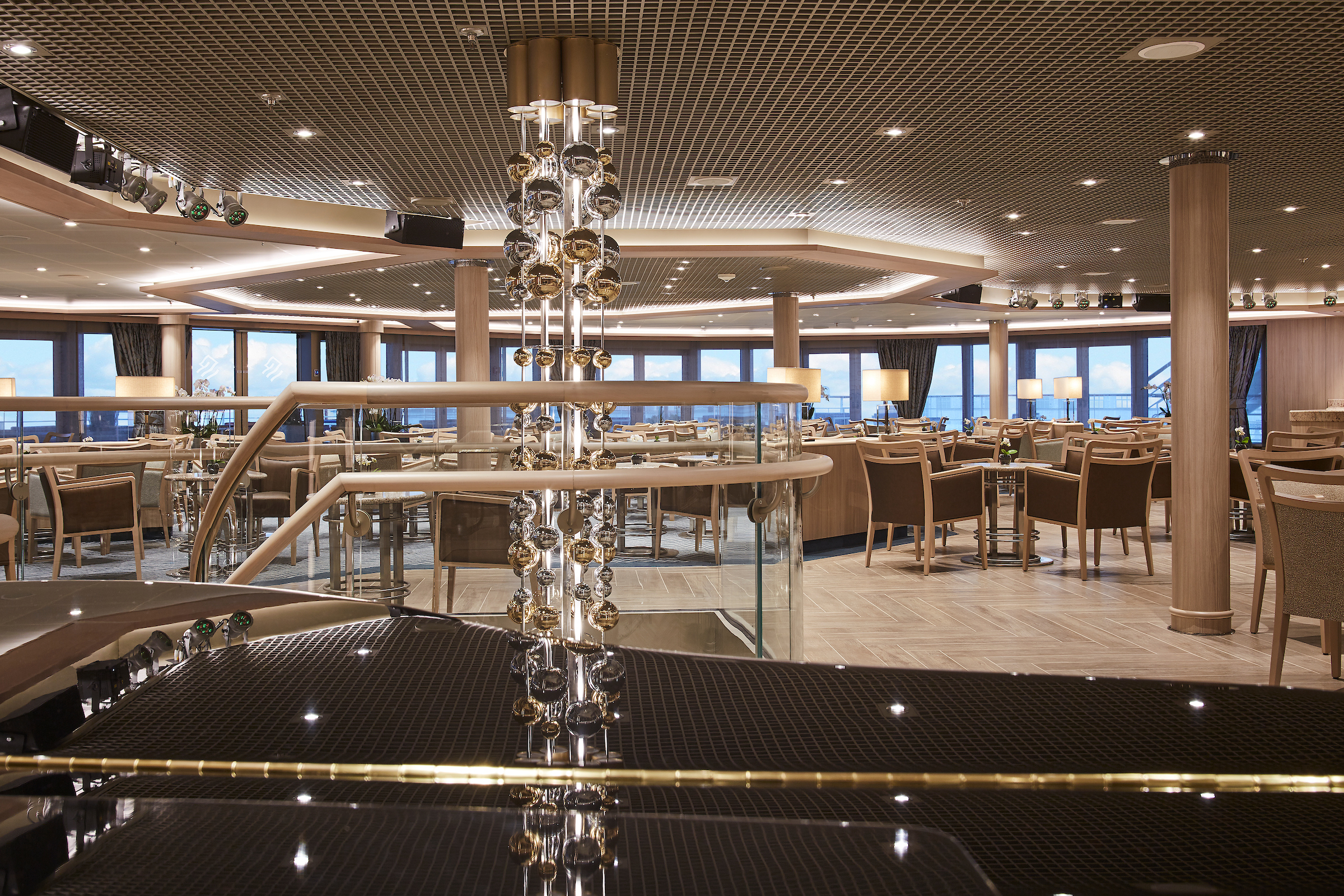
Dolce Vita is the gathering place for our savvy travellers of the world, a place where guests mingle and exchange stories and where new faces become lifelong friends.
What could be a more fitting name for the very heart of Silver Muse? Central to the soul and inspiration behind Silversea’s Italian heritage, Dolce Vita is the gathering place for our savvy travellers of the world, a place where guests mingle and exchange stories and where new faces become lifelong friends. Let us spoil you with an incredible array of flawless cocktails, wines and spirits, as you relax, enjoy the evening sounds of a live pianist and enjoy “the sweet life” aboard.
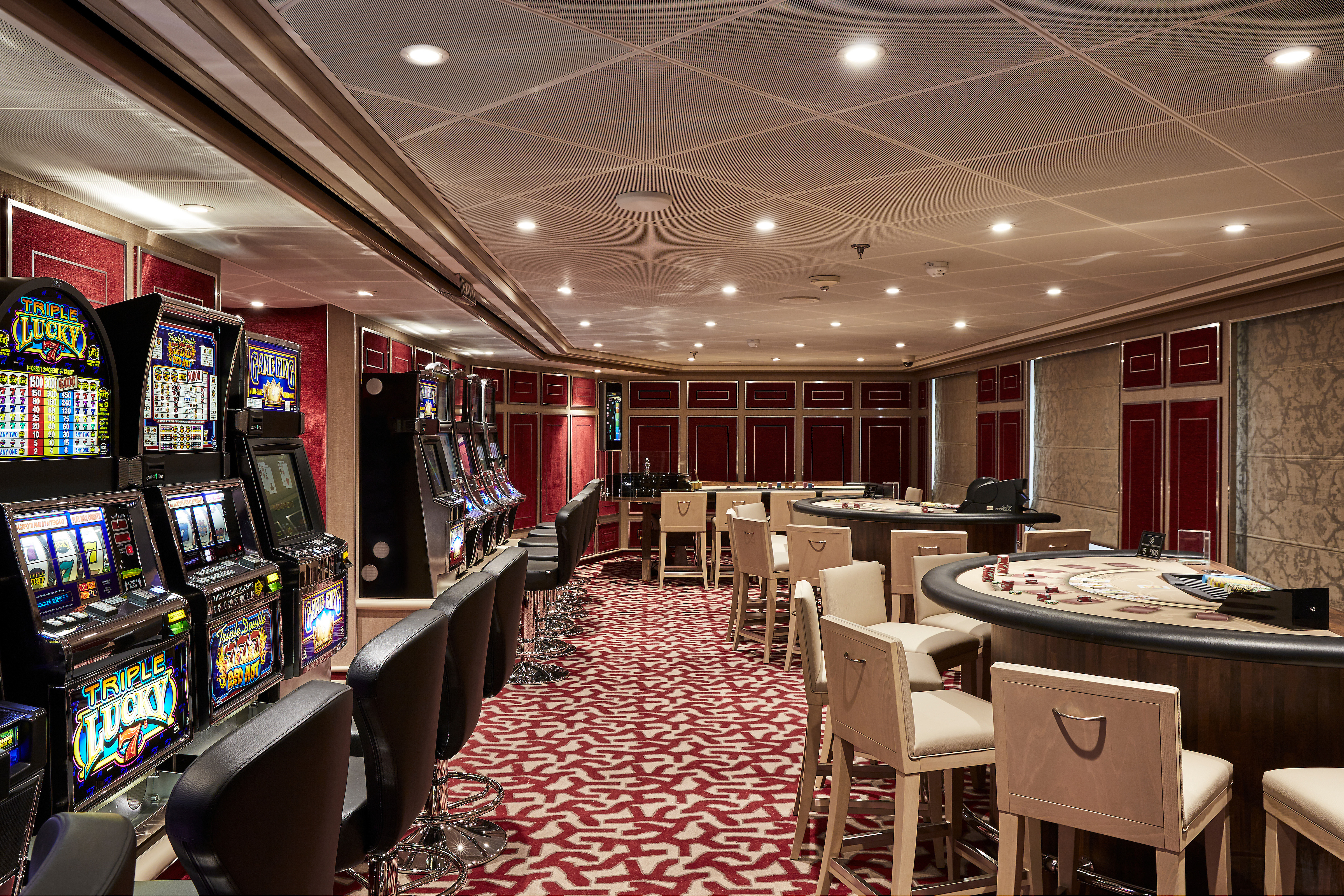
Enjoy a selection of games at the Silversea Casino for guests 18 and older, or discover new games during your luxury cruise.
Let the fun begin! Channel your inner James Bond and enjoy a flutter at a variety of table games including American Roulette, Blackjack and Ocean Poker as Silver Muse glides silently through the waves. An assortment of multi-game, multi-denominational reel and video slot machines are also available. Prepare yourself for a luxurious and exhilarating experience with every turn of a card and spin of the wheel. Game on!
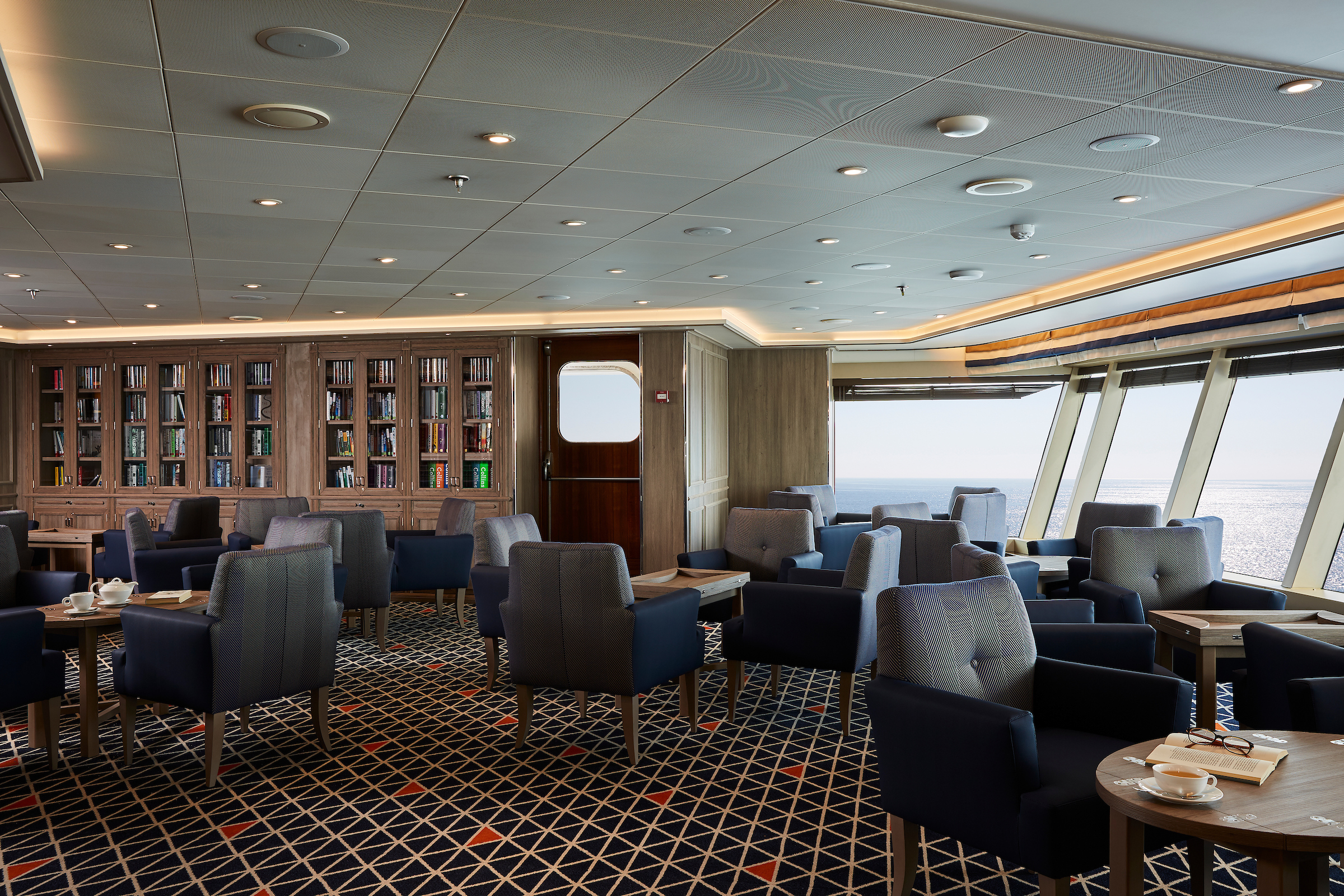
The Observation Library boasts exceptional views overlooking the ocean as it stretches out below you while you enjoy your cruise.
The eponymous lounge carries its name well. Set on the highest level at the very top of the ship, this is a quiet space for reading and reflection while being dazzled by the undulating seascapes that are constituent to life on board. Borrow a book from the in-house library, read the papers or just embrace the tranquillity of being at sea.
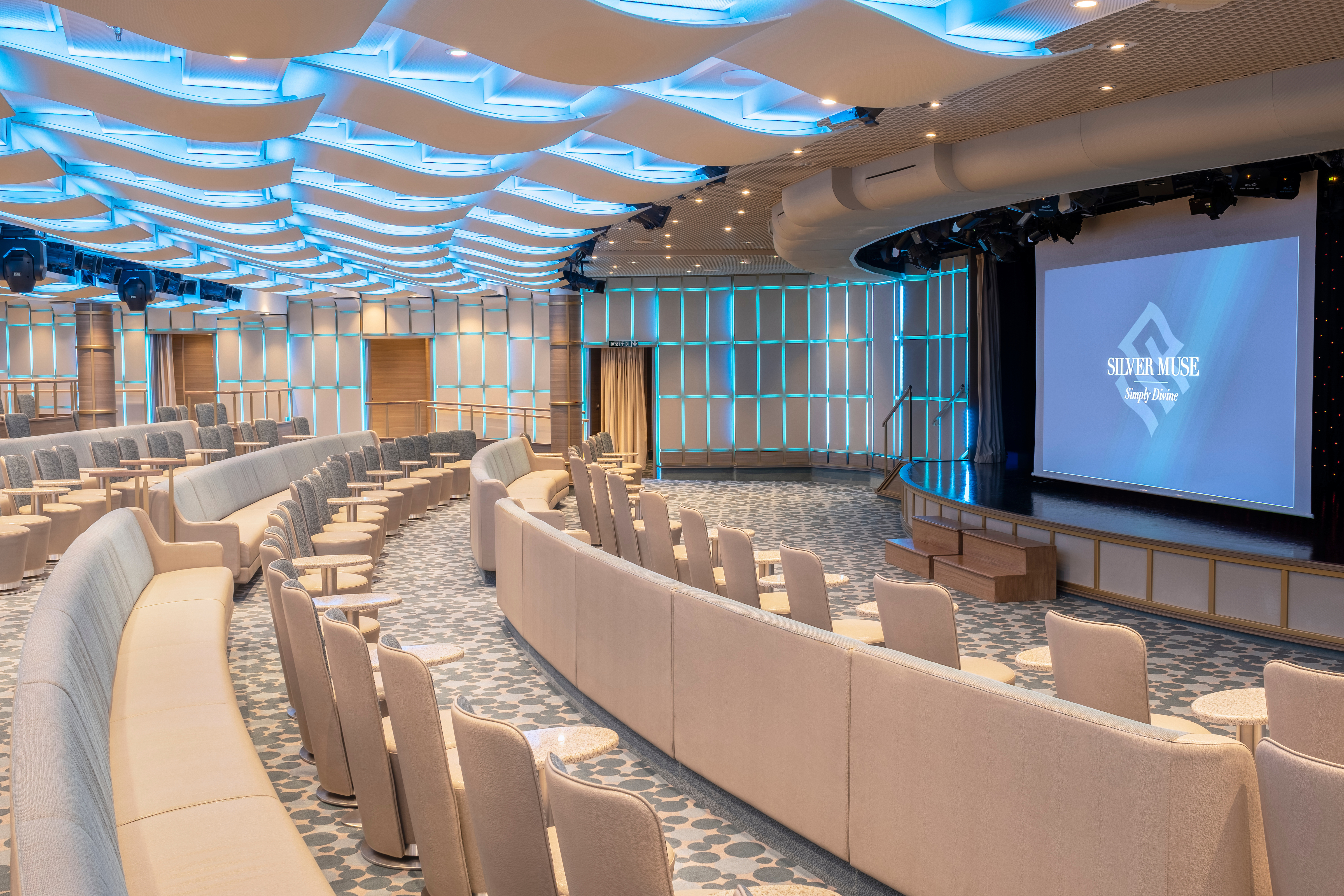
Welcome to Venetian Lounge, a place where the arts of theatre and music meet with full-scale productions and feature films.
The grandeur and magic of music and theatre. The experience of being transported by performance. That satisfying feeling of seeing an evening show … Welcome to Venetian Lounge, a place where the arts of theatre and music meet with full-scale productions and feature films. Paying tribute to a golden age of glamour, Venetian Lounge offers belle-époque style cabaret seating, with intimate tables and chairs subtly placed between the rows of comfortable tiered banquettes. As the stage lights are dimmed, soak up the atmosphere, relax and enjoy a night of dazzling sights and sounds.
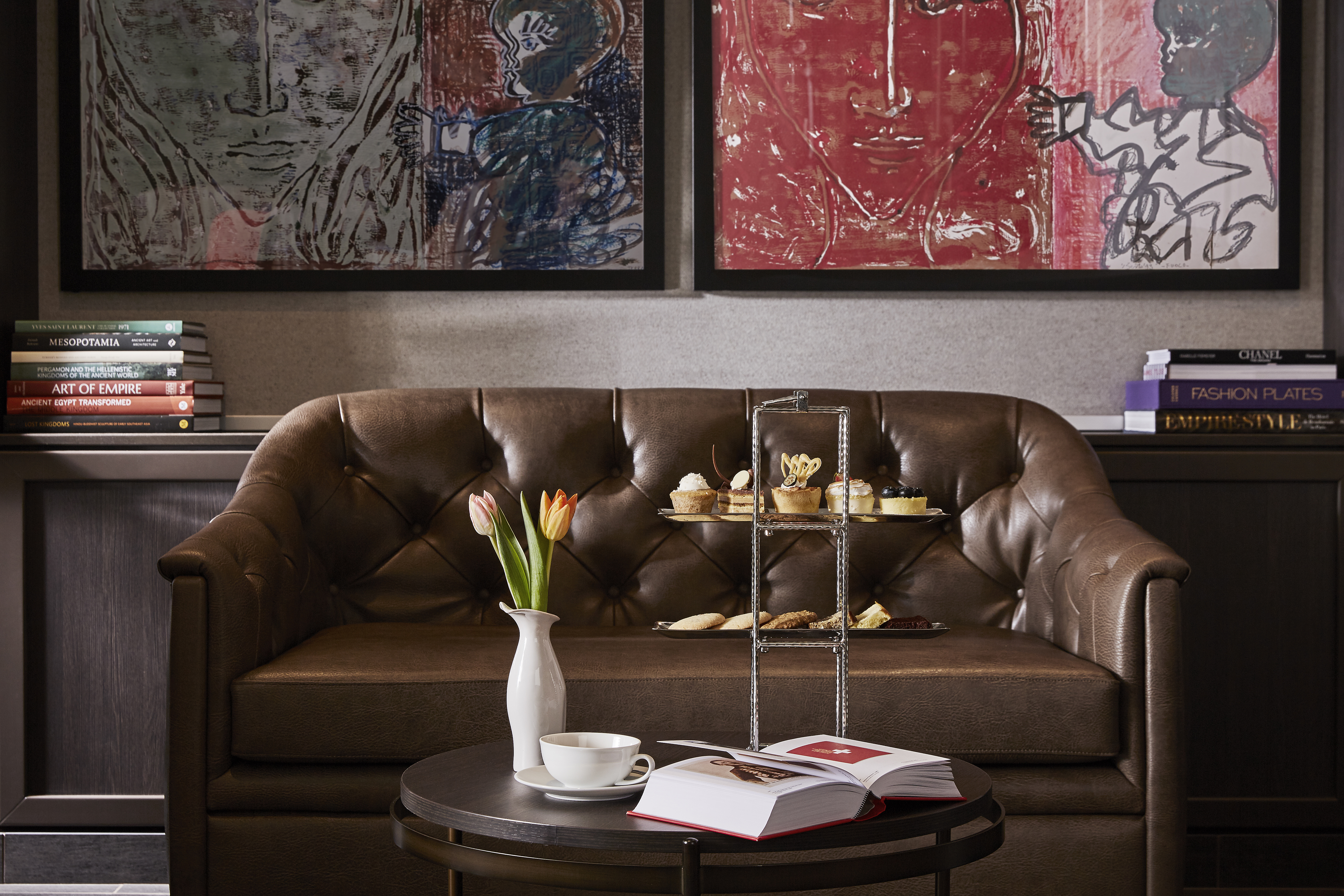
Hosting various, exciting exhibitions, the Arts Café will showcase painting and sculptures from a broad range of talent.
Nestled cosily on deck 8 is the all-new Arts Café. Hosting varied and exciting exhibitions, the Arts Café will showcase paintings and sculptures from a broad range of talent. The distinctive design of the venue is a relaxing getaway and offers daytime cuisine in the form of a café and deli-bar. But come early evening, the venue turns into a lively, evening cocktail lounge meaning you can retreat to one of the comfortable chairs, grab a drink and relax as you absorb the incredible view and watch the world float by. Whether you prefer the gentle sea breeze of the terrace or the sophistication of the inside, a superlative experience is always assured.
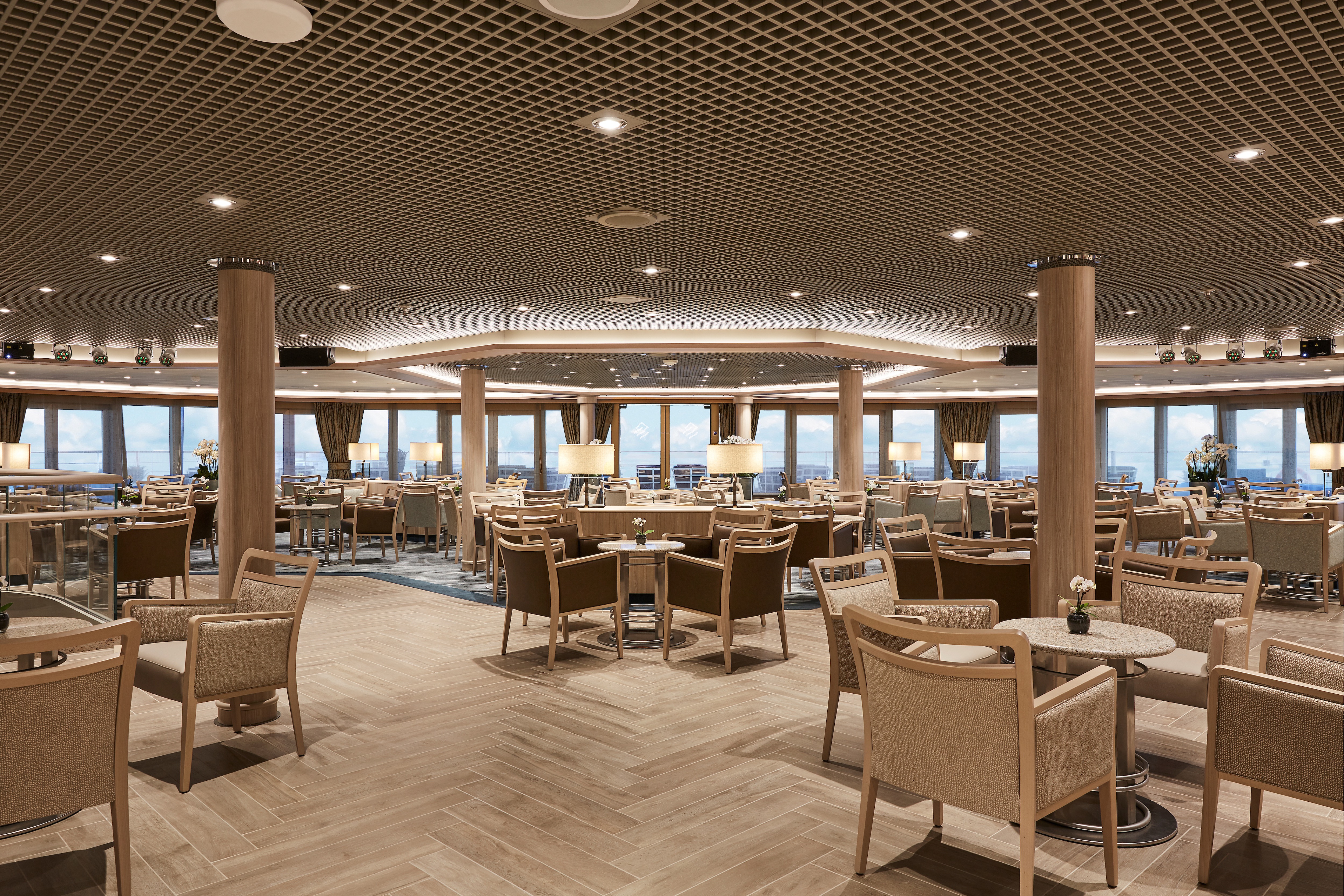
A peaceful retreat that is the perfect place to break away to, a social place to meet and greet old friends, or an evening venue to partake in a cocktail as you sit back and watch the world go by.
From early morning to late at night, the Panorama lounge offers everything you could wish for. A peaceful retreat that is the perfect place to break away to, a social place to meet and greet old friends, or an evening venue to partake in a cocktail as you sit back and watch the world go by. Sink into the plush seats and come evening, enjoy listening to the gentle sounds of a pianist, or the invigorating beats of our in-house DJ.
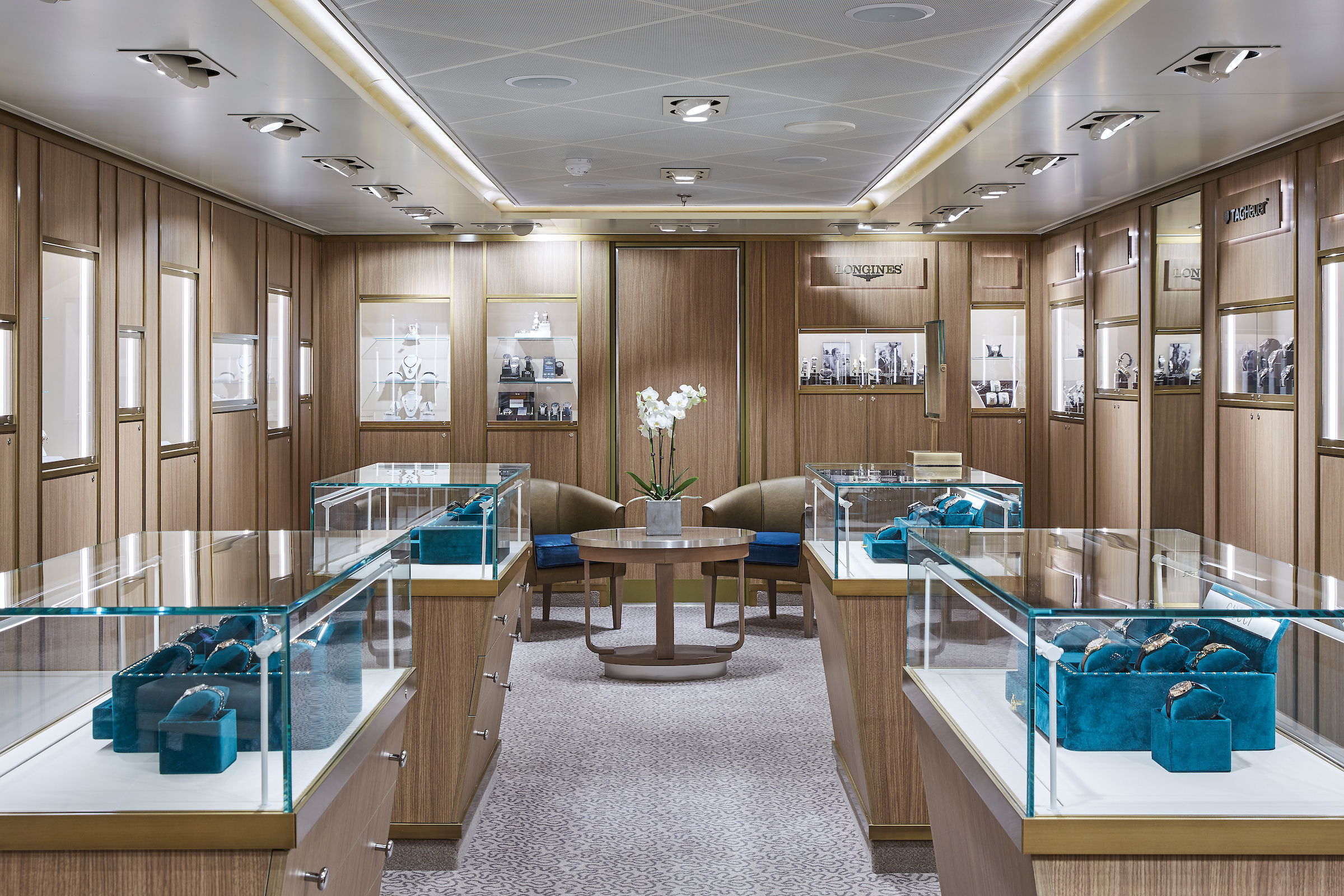
There is a wealth of luxury shopping experiences aboard all Silversea ships, featuring the most distinctive and appealing brands from across the globe.
Exceptional shopping experiences do not end in the cosmopolitan cities we visit. Silversea’s striking new shipboard boutiques, reimagined and redesigned are stunning modern design spaces befitting the finest creations from legendary designers. Carefully selected partners onboard Silversea’s duty-free boutiques offers our guests a carefully curated selection of cutting edge fashions, jewellery, accessories, fine perfumes, cosmetics and Silversea Logo collection all at duty-free prices.
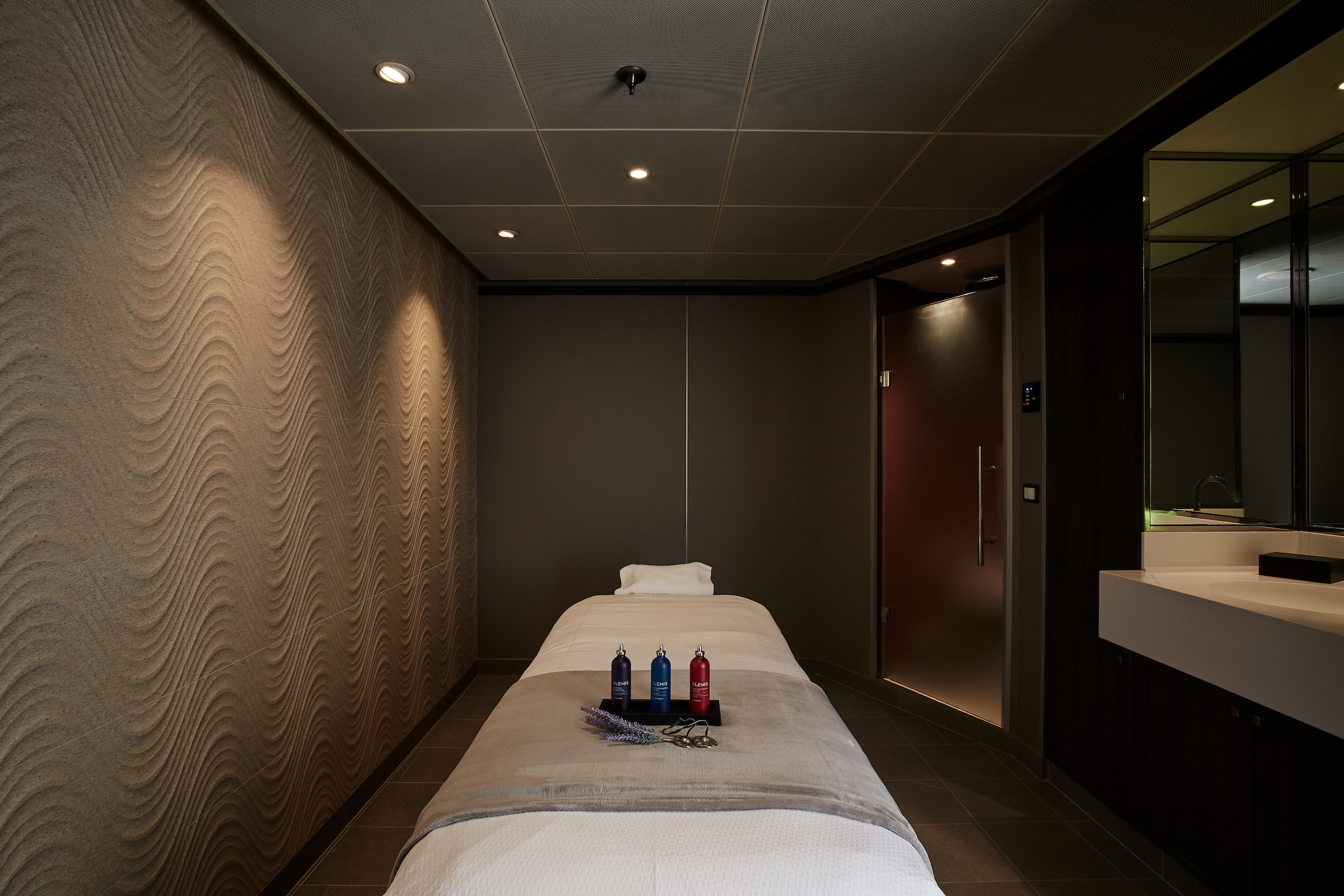
The Zagara Beauty Spa by Silversea is a sanctuary of pure bliss… Sweeping sea views from the floor-to-ceiling windows, nine treatment rooms, an acupuncture suite, relaxation areas and a dedicated outdoor whirlpool allow delectable indulgence on board.
Relax, rejuvenate and renew all your senses. The Zagara Beauty Spa by Silversea is a sanctuary of pure bliss… Sweeping sea views from the floor-to-ceiling windows, nine treatment rooms, an acupuncture suite, relaxation areas and a dedicated outdoor whirlpool allow delectable indulgence on board. Invigorating therapies including facials, body wraps and massages, plus men’s and women’s saunas and steam rooms are perfect for relaxing before your spa treatment or after your workout.
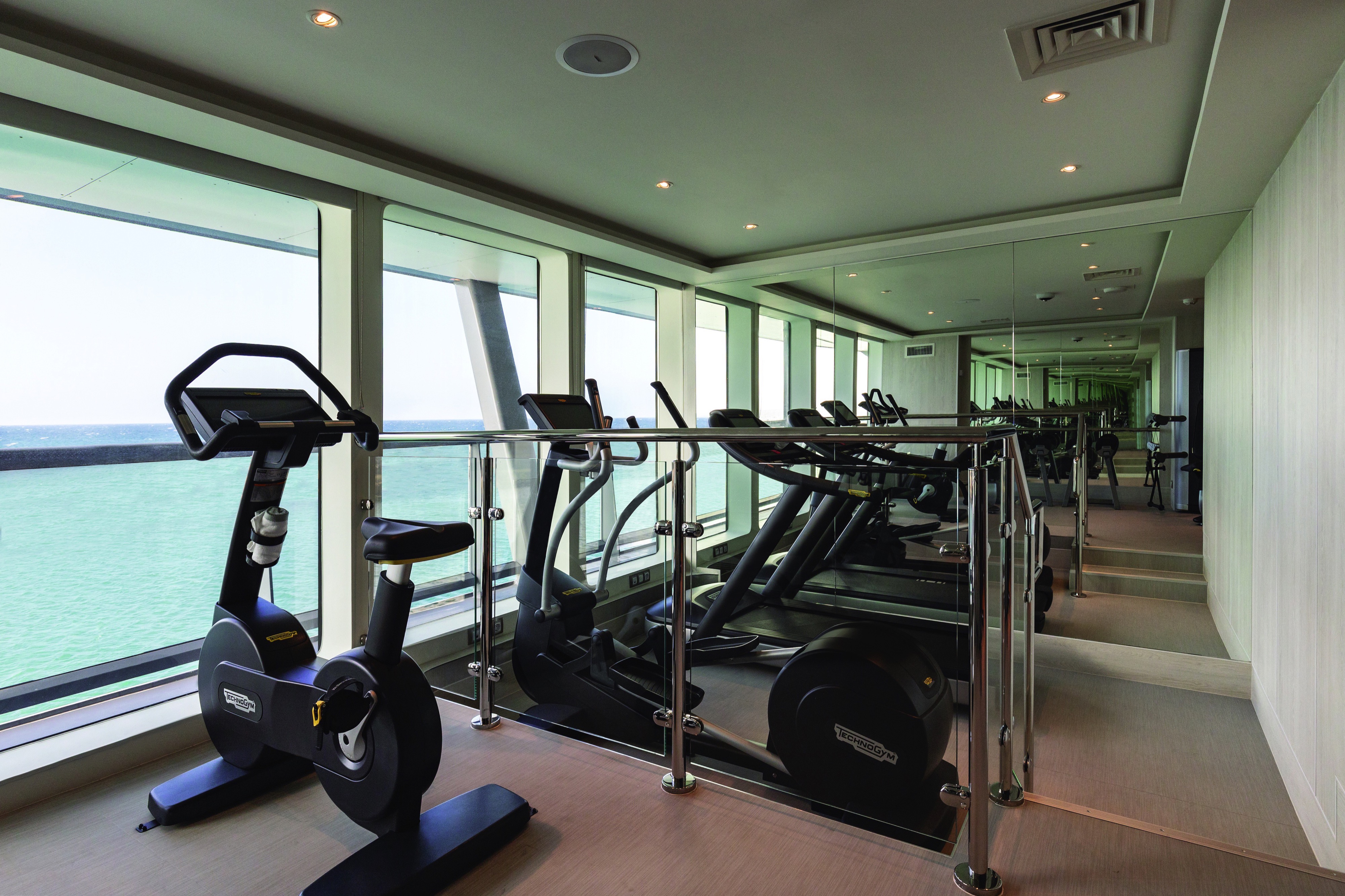
The Fitness Centre brings together elite design with programs that are specifically created for your body type and needs.
With state of the art Technogym® equipment, free weights and speciality classes, the Fitness Centre brings together elite design with programs that are specifically created for your body type and needs. With personal trainers available for individual sessions, training here is more a five-star experience for all levels of fitness and experience. And with the best view that you’ll ever get whilst working out, there are definitely no more excuses …
Images are intended as a general reference. Features, materials, finishes and layout may be different than shown.
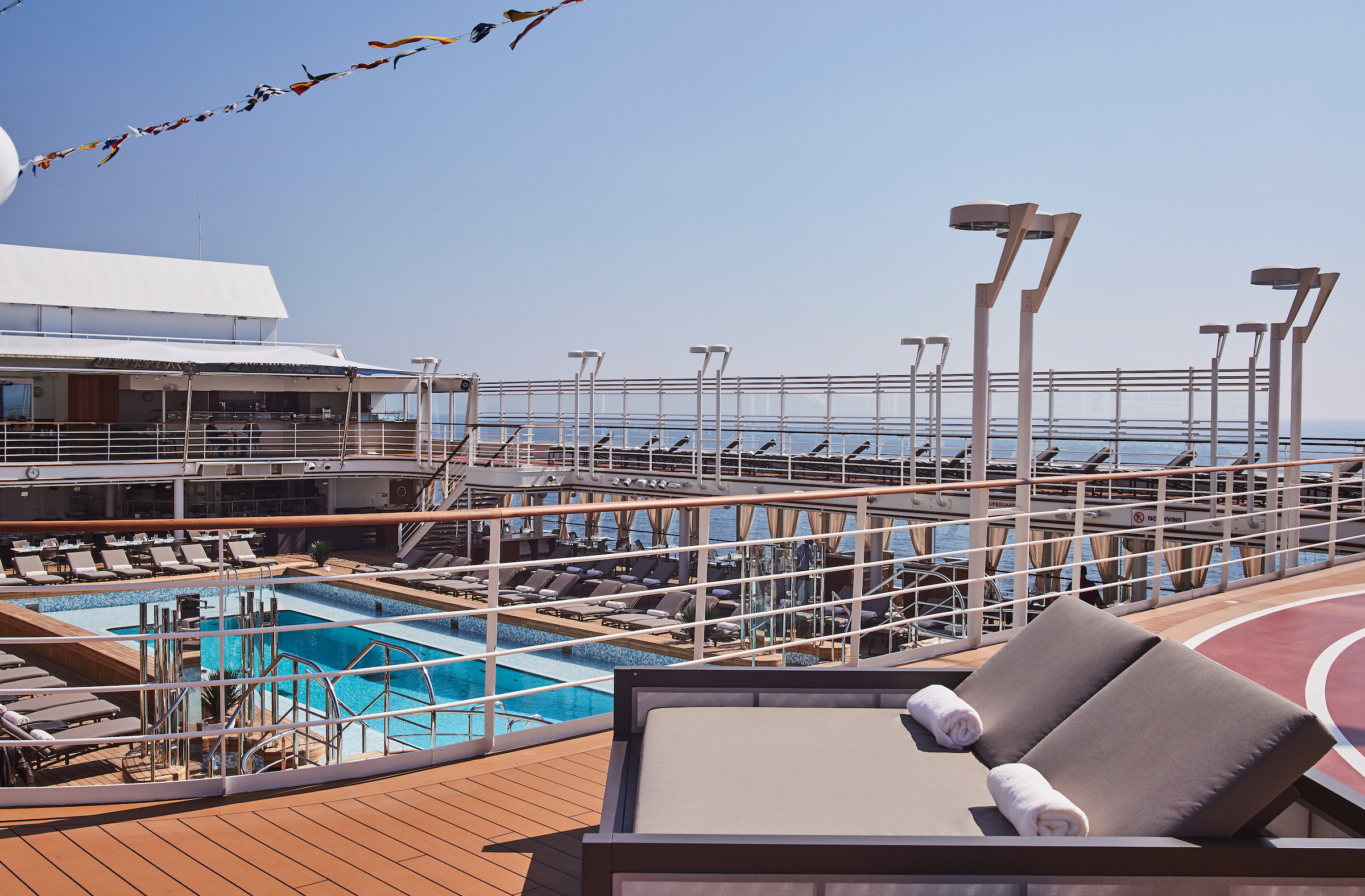
Take a dip in the pool, relax in one of the whirlpools or simply soak up the view from one of the sunbeds, while your pool attendant anticipates your every whim.
The epitome of open air living — defining how you enjoy the outdoors, this is the place to cool off, unwind and enjoy the sunshine. Take a dip in the pool, relax in one of the whirlpools or simply soak up the view from one of the sunbeds, while your pool attendant anticipates your every whim. A little more ice? Certainly. A plush towel to dry off with? Of course. With breathtaking landmarks gliding by, dive into the clear waters in a setting that is so idyllic that you will not want to disembark.
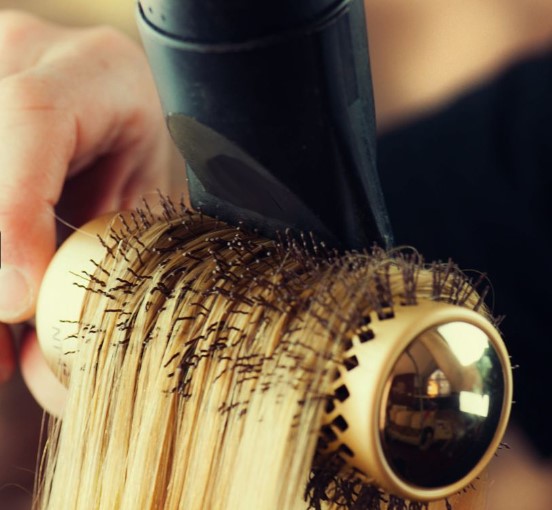
A full range of salon services including hairstyling, manicures and pedicures, is available on board this luxury cruise ship for both men and women. Appointments for these chargeable services may be made on board the ship, or in advance via My Silversea. Maintain the look of prestige travel while you cruise.
For Silversea Expeditions guests, casual resort wear is appropriate at all times when on board, with the exception of two evenings when Informal attire is required. For men, this means a jacket, tie optional.
Wheelchair guests must bring their own collapsible wheelchair. Please note that not all shore excursions are suitable for guests with impaired mobility. Silversea strongly recommends wheelchair guests travel with someone who is able to assist them both ashore and at sea as Silversea may be unable to offer special assistance. Please note that wheel-on and/or wheel-off access may not be available at some ports-of-call. Silversea reserves the right to deny boarding to any guest who failed to notify Silversea of such requirement at the time of booking.
All guests are required to report in writing to Silversea at the time their reservation is made:
- Any physical or mental condition that may require medical or professional treatment or attention during the voyage
- Any condition that may render the guest unfit for travel, or that may require special care or assistance
- Any condition that may pose a risk or danger to the guest or anyone else on board the ship
- Any condition that may require oxygen for medical reasons
- Any intention or need to use a wheelchair aboard ship.
If you have special dietary requirements, Silversea will make every attempt to accommodate your requests. Please advise Silversea of your needs on the Guest Information Form at least 75 days prior to sailing. Notification should be sent to specialservices@silversea.com
Each Silversea ship is equipped with a Medical Centre, which is staffed by a doctor and nurse on 24-hour call when at sea. When docked, supplementary emergency care may also be obtained through local medical facilities. Guests may be charged for medical services and for medications used for their medical treatment. The Medical Centre is not intended or designed to provide on-going treatment of pre-existing conditions or for extended critical care, and Silversea is not responsible for the diagnosis, treatment or services furnished by shipboard medical personnel.
Silversea cruise guidelines state that children under the age of 18 must be accompanied, in the same or connecting suite, by a parent or other responsible adult over the age of 21 for the duration of the voyage. If the adult accompanying the minor is not their parent, a parental consent guardianship form must be signed by a parent or legal guardian and received by Silversea prior to sailing. Please contact our Special Services Department at SpecialServices@Silversea.com for a Parental Consent Form. Guests must be 21 years of age or older to purchase or consume alcohol. Silversea reserves the right to refuse to serve anyone who in its sole judgment may be under the influence of alcohol, or for any reason necessary in its judgement to preserve the health and safety of guests and employees.
Silversea cannot accommodate infants less than six months of age and reserves the right to limit the number of children less than three years of age (Silver Explorer, Silver Cloud and Silver Wind cannot accommodate infants under the age of 1 year, Silver Origin cannot accommodate children under the age of 5 years). Parents are required to sign a notarised waiver prior to sailing in order to grant a valid booking for children ages between 6 months and 1 year old. A signed and notarised waiver will be required for all children between these ages. Although Silversea accepts guests over the age of 6 months (over the age of 1 year for Silversea Expeditions), there are no special programmes for children on board our luxury cruise ships, and Silversea does not provide for the care, entertainment or supervision of children. Silversea reserves the right to limit the number of children less than 3 years of age.
Children under the age of 8 years old are only permitted to participate in suitable Silver Shore Excursions / shuttle service if the vehicles are equipped with the correct safety harness and seating equipment. Child harnesses and secure seating cannot be guaranteed. Silversea reserves the right to refuse children under the age of 8 years old on any tour on the basis of safety. Guests may use their own approved safety seat, booster seat or harness provided they are compatible with the local touring vehicle and can properly secure the child.
In addition, the Zodiacs used for Silversea Expeditions are unable to accommodate children younger than 5 years of age. As Silversea does not provide babysitting services, an adult family member will be required to remain on board with their child(ren) during Zodiac excursions.
At Silversea, the comfort, enjoyment and safety of all guests is paramount. To ensure a pleasant and safe environment, smoking is prohibited in most public areas, guest suites or suite balconies. However, cigarette, e-cigarette, cigar, pipe and vaporizer smoking is permitted in the Connoisseur’s Corner both indoors and outdoors (where applicable). In addition, cigarette, e-cigarette and vaporizer smoking is permitted in specifically designated outside areas and tables:
- Silver Nova, Silver Ray: Dusk Bar (port side);
- Silver Muse, Silver Spirit: Panorama Lounge (port side) and Pool Grill (port side);
- Silver Moon, Silver Dawn: Panorama Lounge (starboard side) and Pool Grill (port side);
- Silver Shadow, Silver Whisper: Panorama Lounge (starboard side) and Pool Grill (starboard side);
- Silver Cloud, Silver Wind: Panorama Lounge (port side) and Pool Grill (port side);
- Silver Origin: on open deck 4 aft;
- Silversea kindly requests that all guests observe the non-smoking areas.
Complete valet services, including laundry, pressing and wet cleaning, are available at an additional charge and may be arranged through your butler. Laundry service is complimentary for certain suite categories and for those Venetian Society members who have reached certain reward levels. A self-service launderette offers washing machines, dryers, irons and laundry supplies, allowing you to limit the amount of cruise luggage needed, especially for longer voyages.
Silversea cruise guidelines state that children under the age of 18 must be accompanied, in the same or connecting suite, by a parent or other responsible adult over the age of 21 for the duration of the voyage. If the adult accompanying the minor is not their parent, a parental consent guardianship form must be signed by a parent or legal guardian and received by Silversea prior to sailing. Please contact our Special Services Department at SpecialServices@Silversea.com for a Parental Consent Form. Guests must be 21 years of age or older to purchase or consume alcohol. Silversea reserves the right to refuse to serve anyone who in its sole judgment may be under the influence of alcohol, or for any reason necessary in its judgement to preserve the health and safety of guests and employees.
Silversea cannot accommodate infants less than six months of age and reserves the right to limit the number of children less than three years of age (Silver Explorer, Silver Cloud and Silver Wind cannot accommodate infants under the age of 1 year, Silver Origin cannot accommodate children under the age of 5 years). Parents are required to sign a notarised waiver prior to sailing in order to grant a valid booking for children ages between 6 months and 1 year old. A signed and notarised waiver will be required for all children between these ages. Although Silversea accepts guests over the age of 6 months (over the age of 1 year for Silversea Expeditions), there are no special programmes for children on board our luxury cruise ships, and Silversea does not provide for the care, entertainment or supervision of children. Silversea reserves the right to limit the number of children less than 3 years of age.
Children under the age of 8 years old are only permitted to participate in suitable Silver Shore Excursions / shuttle service if the vehicles are equipped with the correct safety harness and seating equipment. Child harnesses and secure seating cannot be guaranteed. Silversea reserves the right to refuse children under the age of 8 years old on any tour on the basis of safety. Guests may use their own approved safety seat, booster seat or harness provided they are compatible with the local touring vehicle and can properly secure the child.
In addition, the Zodiacs used for Silversea Expeditions are unable to accommodate children younger than 5 years of age. As Silversea does not provide babysitting services, an adult family member will be required to remain on board with their child(ren) during Zodiac excursions.

- Observation Library
- Silver Suites
- Spaccanapoli
- Jogging Track
- Launderette
- Elevator

- Pool Deck
- Pool Bar
- The Grill
- Whirlpool Area
- Silver Suites
- Launderette
- Elevator

- Panorama Lounge
- Activities Room & Outdoor Area
- Superior Veranda Suites
- Silver Suites (x1 Accessible Suite)
- Grand Suites
- Owner’s Suites
- Panorama Suites
- Launderette
- Elevator

- Connoisseur’s Corner
- Boutique
- Arts Café
- Conference/Card Room
- Launderette
- Grand Suites
- Superior Veranda Suites
- Deluxe Veranda Suites
- Elevator

- La Terrazza
- Silver Note
- Casino
- Launderette
- Royal Suites
- Deluxe Verandah Suites
- Superior Verandah Suites
- Elevator

- Zagara Beauty Spa
- Steam Rooms and Saunas
- The Fitness Centre
- Aerobic Studios
- Thermal Suite
- Whirlpool
- Launderette
- Classic Veranda Suites
- Deluxe Veranda Suites
- Elevator

- Reception/Guest Relations
- Shore Concierge
- Dolce Vita
- Launderette
- Venetian Lounge
- Future Cruise Manager
- Classic Veranda Suites
- Elevator

- Atlantide
- Indochine
- Kaiseki
- La Dame
- Launderette
- Vista Suites
- Elevator

